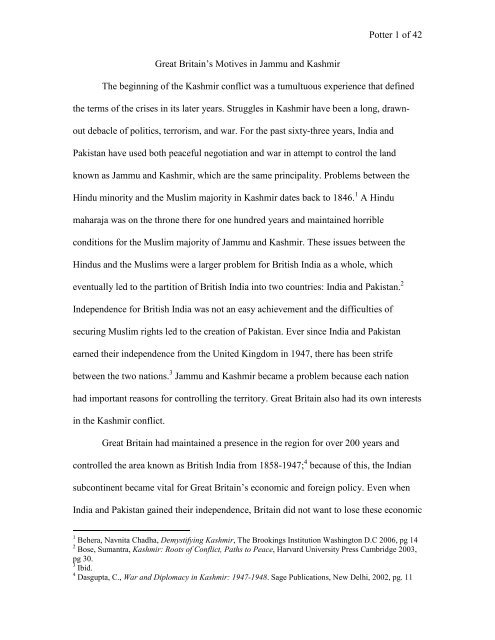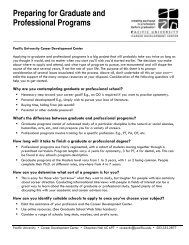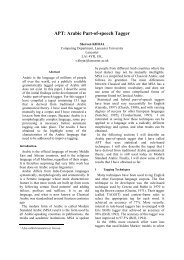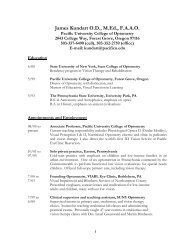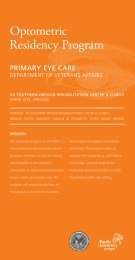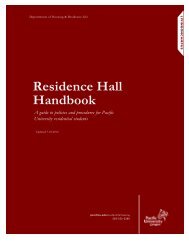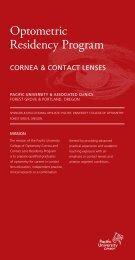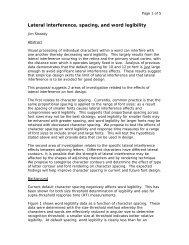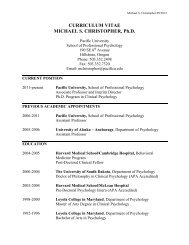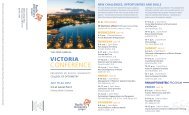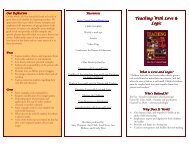Great Britain's Motives in Jammu and Kashmir - Pacific University
Great Britain's Motives in Jammu and Kashmir - Pacific University
Great Britain's Motives in Jammu and Kashmir - Pacific University
Create successful ePaper yourself
Turn your PDF publications into a flip-book with our unique Google optimized e-Paper software.
Potter 1 of 42<br />
<strong>Great</strong> Brita<strong>in</strong>’s <strong>Motives</strong> <strong>in</strong> <strong>Jammu</strong> <strong>and</strong> <strong>Kashmir</strong><br />
The beg<strong>in</strong>n<strong>in</strong>g of the <strong>Kashmir</strong> conflict was a tumultuous experience that def<strong>in</strong>ed<br />
the terms of the crises <strong>in</strong> its later years. Struggles <strong>in</strong> <strong>Kashmir</strong> have been a long, drawnout<br />
debacle of politics, terrorism, <strong>and</strong> war. For the past sixty-three years, India <strong>and</strong><br />
Pakistan have used both peaceful negotiation <strong>and</strong> war <strong>in</strong> attempt to control the l<strong>and</strong><br />
known as <strong>Jammu</strong> <strong>and</strong> <strong>Kashmir</strong>, which are the same pr<strong>in</strong>cipality. Problems between the<br />
H<strong>in</strong>du m<strong>in</strong>ority <strong>and</strong> the Muslim majority <strong>in</strong> <strong>Kashmir</strong> dates back to 1846. 1 A H<strong>in</strong>du<br />
maharaja was on the throne there for one hundred years <strong>and</strong> ma<strong>in</strong>ta<strong>in</strong>ed horrible<br />
conditions for the Muslim majority of <strong>Jammu</strong> <strong>and</strong> <strong>Kashmir</strong>. These issues between the<br />
H<strong>in</strong>dus <strong>and</strong> the Muslims were a larger problem for British India as a whole, which<br />
eventually led to the partition of British India <strong>in</strong>to two countries: India <strong>and</strong> Pakistan. 2<br />
Independence for British India was not an easy achievement <strong>and</strong> the difficulties of<br />
secur<strong>in</strong>g Muslim rights led to the creation of Pakistan. Ever s<strong>in</strong>ce India <strong>and</strong> Pakistan<br />
earned their <strong>in</strong>dependence from the United K<strong>in</strong>gdom <strong>in</strong> 1947, there has been strife<br />
between the two nations. 3 <strong>Jammu</strong> <strong>and</strong> <strong>Kashmir</strong> became a problem because each nation<br />
had important reasons for controll<strong>in</strong>g the territory. <strong>Great</strong> Brita<strong>in</strong> also had its own <strong>in</strong>terests<br />
<strong>in</strong> the <strong>Kashmir</strong> conflict.<br />
<strong>Great</strong> Brita<strong>in</strong> had ma<strong>in</strong>ta<strong>in</strong>ed a presence <strong>in</strong> the region for over 200 years <strong>and</strong><br />
controlled the area known as British India from 1858-1947; 4 because of this, the Indian<br />
subcont<strong>in</strong>ent became vital for <strong>Great</strong> Brita<strong>in</strong>’s economic <strong>and</strong> foreign policy. Even when<br />
India <strong>and</strong> Pakistan ga<strong>in</strong>ed their <strong>in</strong>dependence, Brita<strong>in</strong> did not want to lose these economic<br />
1 Behera, Navnita Chadha, Demystify<strong>in</strong>g <strong>Kashmir</strong>, The Brook<strong>in</strong>gs Institution Wash<strong>in</strong>gton D.C 2006, pg 14<br />
2 Bose, Sumantra, <strong>Kashmir</strong>: Roots of Conflict, Paths to Peace, Harvard <strong>University</strong> Press Cambridge 2003,<br />
pg 30.<br />
3 Ibid.<br />
4 Dasgupta, C., War <strong>and</strong> Diplomacy <strong>in</strong> <strong>Kashmir</strong>: 1947-1948. Sage Publications, New Delhi, 2002, pg. 11
Potter 2 of 42<br />
<strong>and</strong> strategic military advantages. Though India <strong>and</strong> Pakistan were no longer colonies of<br />
Brita<strong>in</strong>, the British cont<strong>in</strong>ued to manipulate their affairs.<br />
In 1947, the Cold War was just beg<strong>in</strong>n<strong>in</strong>g <strong>and</strong> fear of the Soviet Union spread<strong>in</strong>g<br />
communist ideals around the world consumed the foreign policy of <strong>Great</strong> Brita<strong>in</strong>.<br />
Because of this, military bases were needed <strong>in</strong> Asia to encircle <strong>and</strong> spy on the eastern<br />
regions of the Soviet Union. India <strong>and</strong> Pakistan are located south of the Soviet Union <strong>and</strong><br />
close enough that any attack from the British Royal Air Force could reach any target <strong>in</strong><br />
the USSR. Thus, the Cold War foreign policy of <strong>Great</strong> Brita<strong>in</strong> depended on ma<strong>in</strong>ta<strong>in</strong><strong>in</strong>g<br />
military bases <strong>in</strong> India <strong>and</strong> Pakistan even after they had lost political control. 5 India <strong>and</strong><br />
Pakistan also held vital economic importance to <strong>Great</strong> Brita<strong>in</strong>, through both resources<br />
<strong>and</strong> trade relations with other nations.<br />
The Middle East’s oil was as an important commodity for <strong>Great</strong> Brita<strong>in</strong> <strong>in</strong> 1947 as<br />
it still is today. 6 <strong>Great</strong> Brita<strong>in</strong> did not want to lose access to this oil because it was such a<br />
vital resource <strong>and</strong> one of the most important items <strong>in</strong> their economic policy. They<br />
believed if they allowed Pakistan to lose <strong>Kashmir</strong>, that the Muslims of the world would<br />
become furious with <strong>Great</strong> Brita<strong>in</strong>. 7 On the other h<strong>and</strong>, India could not lose territory<br />
either because <strong>Great</strong> Brita<strong>in</strong> wanted to ma<strong>in</strong>ta<strong>in</strong> their primary position <strong>in</strong> the<br />
Commonwealth as a trade partner; Pakistan was also <strong>in</strong> the Commonwealth. I argue that<br />
<strong>Great</strong> Brita<strong>in</strong> determ<strong>in</strong>ed that it was <strong>in</strong> its <strong>in</strong>terest for the <strong>Kashmir</strong> conflict between India<br />
<strong>and</strong> Pakistan to be unresolved, <strong>and</strong> that, from the outset, <strong>Great</strong> Brita<strong>in</strong> <strong>in</strong>tentionally<br />
prolonged the situation there to better serve its political <strong>and</strong> economic <strong>in</strong>terests.<br />
5 Ibid, pg 13.<br />
6 … pg 16.<br />
7 … pg 17.
Potter 3 of 42<br />
Archival material found <strong>in</strong> secondary sources <strong>and</strong> documents exam<strong>in</strong><strong>in</strong>g the<br />
situation from the perspective of the United Nations demonstrate this clearly. Specifically,<br />
the archive material <strong>in</strong>cludes letters <strong>and</strong> telegrams between the United K<strong>in</strong>gdom Cab<strong>in</strong>et<br />
<strong>and</strong> Prime M<strong>in</strong>ister Clement Atlee. In addition there are secret orders given by India’s<br />
Governor-General, Lord Louis Mountbatten, <strong>and</strong> the comm<strong>and</strong>er of India <strong>and</strong> Pakistan’s<br />
armed forces, Comm<strong>and</strong>er Auch<strong>in</strong>leck, that describe how the British set up their<br />
manipulations <strong>in</strong> <strong>Kashmir</strong>. In addition, to the British perspective on this conflict, sources<br />
from India’s Prime M<strong>in</strong>ister Jawaharlal Nehru <strong>and</strong> Pakistan’s representative at the United<br />
Nations, Sir Muhammad Zafrullah Khan, also show how India <strong>and</strong> Pakistan viewed the<br />
British role at the beg<strong>in</strong>n<strong>in</strong>g of the dissent.<br />
To underst<strong>and</strong> the British role <strong>in</strong> this discord, the time covered <strong>in</strong> this paper is<br />
from October 1947, the date when this hostility began, until January 1948, the date of the<br />
first important meet<strong>in</strong>g of the UN Security Council over the dissension. The focus here is<br />
how <strong>Great</strong> Brita<strong>in</strong>’s Cab<strong>in</strong>et was able to implement their manipulations on India <strong>and</strong><br />
Pakistan. These manipulations concentrated on f<strong>in</strong>d<strong>in</strong>g a peaceful solution <strong>in</strong> which<br />
neither India nor Pakistan regretted the loss of <strong>Kashmir</strong>. The idea presented here is a new<br />
topic because it is not <strong>in</strong> support of either India or Pakistan acquir<strong>in</strong>g <strong>Kashmir</strong>. By<br />
exam<strong>in</strong><strong>in</strong>g these motives, people can realize that fight<strong>in</strong>g <strong>and</strong> terrorism cont<strong>in</strong>ues today<br />
<strong>in</strong> <strong>Kashmir</strong> because of British desires at the outset.<br />
When historians discuss the <strong>Kashmir</strong> dispute, the topic of <strong>Great</strong> Brita<strong>in</strong>’s<br />
<strong>in</strong>volvement is not often addressed. Because the struggle is now enter<strong>in</strong>g its sixty-third<br />
year <strong>and</strong> many horrible events have occurred, <strong>Great</strong> Brita<strong>in</strong>’s <strong>in</strong>volvement <strong>in</strong> the<br />
beg<strong>in</strong>n<strong>in</strong>g has become lost <strong>in</strong> the historical record. In addition, s<strong>in</strong>ce the Cold War
Potter 4 of 42<br />
encouraged secret diplomacy beh<strong>in</strong>d closed doors, the issues of their diplomatic actions<br />
were not <strong>in</strong>itially chronicled <strong>in</strong> texts about <strong>Kashmir</strong>. A side effect of this is that authors<br />
writ<strong>in</strong>g about the discord <strong>in</strong> <strong>Kashmir</strong> are only now realiz<strong>in</strong>g how <strong>in</strong>fluential <strong>Great</strong> Brita<strong>in</strong><br />
was <strong>in</strong> the beg<strong>in</strong>n<strong>in</strong>g. Another common aspect <strong>in</strong> the historiography is that authors tend<br />
to favor the position of either Pakistan or India, because the conflict is on-go<strong>in</strong>g.<br />
There has been a lack of <strong>in</strong>formation on <strong>Great</strong> Brita<strong>in</strong>’s <strong>in</strong>volvement <strong>in</strong> the<br />
<strong>Kashmir</strong> hostility <strong>in</strong> historical works. This is often the case because the topic of<br />
diplomacy is not the author’s focus, such as Praveen Swami’s, India, Pakistan <strong>and</strong> The<br />
Secret Jihad: The Covert War <strong>in</strong> <strong>Kashmir</strong> 1947-2004. This is noticeable <strong>in</strong> Swami’s book<br />
because he is concentrat<strong>in</strong>g on the covert operations that India <strong>and</strong> Pakistan unleashed<br />
aga<strong>in</strong>st each other <strong>in</strong> <strong>Kashmir</strong>. Swami’s work is an example of most books about<br />
<strong>Kashmir</strong> because, as his ma<strong>in</strong> argument portrays, there are recent problems to confront<br />
<strong>and</strong> solve, such as terrorism: “In essence, this book presents a new map of <strong>Jammu</strong> <strong>and</strong><br />
<strong>Kashmir</strong>, a re-draw<strong>in</strong>g of events with the jihad <strong>and</strong> its authors at the centre.” 8 In addition<br />
to works like Swami’s, others usually focus on the entire <strong>Kashmir</strong> conflict <strong>and</strong> not just a<br />
specific area.<br />
In Sumantra Bose’s work <strong>Kashmir</strong>: Roots of Conflict, Paths to Peace, the primary<br />
focus is on the overall struggle so that a solution to the conflict can be found. Her ma<strong>in</strong><br />
argument focuses on achiev<strong>in</strong>g a peaceful solution to the hostility: “The Dual purpose of<br />
this book is to expla<strong>in</strong> how the <strong>Kashmir</strong> issue has come to present such a grave threat to<br />
South Asia’s peace <strong>and</strong> to global security <strong>in</strong> the early twenty-first century, <strong>and</strong> to shed<br />
8 Swami, Praveen. India, Pakistan <strong>and</strong> The Secret Jihad: The Covert War <strong>in</strong> <strong>Kashmir</strong> 1947-2004.<br />
Routledge, New York, 2007, pg 3.
Potter 5 of 42<br />
light on what can be done about this situation.” 9 This is an <strong>in</strong>terest<strong>in</strong>g idea for a work <strong>and</strong><br />
Bose hopes to reach a wider audience for her book to <strong>in</strong>form them of the current situation.<br />
Then there are works like Navnita Chadha Behera’s Demystify<strong>in</strong>g <strong>Kashmir</strong> that focuses<br />
on the political schem<strong>in</strong>g between India <strong>and</strong> Pakistan.<br />
Behera’s focus is on the political schem<strong>in</strong>g, which encompassed the entire<br />
struggle. Her argument <strong>in</strong> this work is that the dissension <strong>in</strong> <strong>Kashmir</strong> was improperly<br />
labeled as a mere territorial dispute, when it is <strong>in</strong> fact, a deeply rooted problem between<br />
H<strong>in</strong>dus <strong>and</strong> Muslims. Like most authors who write about the <strong>Kashmir</strong> dissent, Behera<br />
only briefly mentions the <strong>in</strong>fluence of <strong>Great</strong> Brita<strong>in</strong>. 10 Works like these are useful,<br />
especially s<strong>in</strong>ce Behera does not favor India or Pakistan, even though she is a teacher at<br />
Delhi <strong>University</strong>. Fortunately, some authors believed that their works should focus on the<br />
beg<strong>in</strong>n<strong>in</strong>g of the <strong>Kashmir</strong> discord <strong>and</strong> as a result, <strong>in</strong>formation towards <strong>Great</strong> Brita<strong>in</strong>’s<br />
<strong>in</strong>volvement was documented.<br />
Authors with non-historical backgrounds have written important material <strong>in</strong><br />
relation to the <strong>Kashmir</strong> conflict. One such case is Ch<strong>and</strong>rasekhar Dasgupta’s War <strong>and</strong><br />
Diplomacy <strong>in</strong> <strong>Kashmir</strong>: 1947-1948. Dasgupta worked <strong>in</strong> the Indian Foreign Service <strong>and</strong><br />
was the Indian Ambassador to Ch<strong>in</strong>a (1993-1996) <strong>and</strong> the European Union (1996-2000).<br />
The focus of his work is on India at the beg<strong>in</strong>n<strong>in</strong>g of the <strong>Kashmir</strong> problem <strong>and</strong> <strong>in</strong><br />
particular, why it was carried out the way it was <strong>in</strong> the first year. This book focuses more<br />
on India but one of the ma<strong>in</strong> arguments of Dasgupta was that <strong>Great</strong> Brita<strong>in</strong> had a<br />
significant effect that first year. War <strong>and</strong> Diplomacy concentrates on the fact that <strong>Great</strong><br />
9 … <strong>Kashmir</strong>: Roots of Conflict, Paths to Peace, pg 6.<br />
10 … Demystify<strong>in</strong>g <strong>Kashmir</strong>, pg 208-217.
Potter 6 of 42<br />
Brita<strong>in</strong> had ulterior motives before <strong>and</strong> dur<strong>in</strong>g the <strong>in</strong>cident from 1947-1948. He believes<br />
that these motives led the issue to last all these years.<br />
The focal po<strong>in</strong>t of his arguments was that the <strong>Kashmir</strong> conflict could have ended<br />
with<strong>in</strong> the first year, <strong>in</strong> India’s favor, if <strong>Great</strong> Brita<strong>in</strong> had not <strong>in</strong>terfered. Dasgupta’s po<strong>in</strong>t<br />
is that <strong>Great</strong> Brita<strong>in</strong> rema<strong>in</strong>ed <strong>in</strong> charge of both India <strong>and</strong> Pakistan’s armies. From there,<br />
he speaks about <strong>Great</strong> Brita<strong>in</strong>’s economic <strong>in</strong>terest of keep<strong>in</strong>g Pakistan a nation because it<br />
allowed good relations with the rest of the Muslim world. As Admiral Cunn<strong>in</strong>gham, a<br />
prom<strong>in</strong>ent leader <strong>in</strong> Brita<strong>in</strong>’s navy, expla<strong>in</strong>s: “if Pakistan’s application were rejected it<br />
would shatter Brita<strong>in</strong>’s relations with the ‘whole Moslem world’ to the detriment of her<br />
strategic position <strong>in</strong> the Middle East <strong>and</strong> North Africa.” 11 This theory of British Imperial<br />
<strong>in</strong>terests was present <strong>in</strong> India too as Dasgupta reveals: “For two centuries, the Indian<br />
Empire was both the object <strong>and</strong> the <strong>in</strong>strument of British strategy <strong>in</strong> the Indian Ocean.” 12<br />
Facts such as these allow Dasgupta’s argument of British <strong>in</strong>terfer<strong>in</strong>g <strong>in</strong> the conflict to<br />
draw it out <strong>in</strong> order to keep both its <strong>in</strong>terests <strong>in</strong>tact to be quite conv<strong>in</strong>c<strong>in</strong>g. While<br />
Dasgupta sees the <strong>in</strong>volvement of the United Nations as a delay<strong>in</strong>g tactic used by the<br />
British, Mark Mazower ma<strong>in</strong>ta<strong>in</strong>s that Brita<strong>in</strong> was <strong>in</strong> fact support<strong>in</strong>g the ideals of the<br />
United Nations alongside their <strong>in</strong>terests <strong>in</strong> his book, No Enchanted Palace: The End of<br />
Empire <strong>and</strong> the Ideological Orig<strong>in</strong>s of the United Nations.<br />
Mazower does not concentrate on the British <strong>in</strong> this piece, but on the orig<strong>in</strong>s of<br />
the United Nations. It was not meant to be a utopian answer to the problems of the world,<br />
but a tool to ma<strong>in</strong>ta<strong>in</strong> the <strong>in</strong>terests of the world’s superpowers. In this book, Mazower<br />
tries to confront the two most common ideas about the orig<strong>in</strong>s of the United Nations:<br />
11 Dasgupta, C., War <strong>and</strong> Diplomacy <strong>in</strong> <strong>Kashmir</strong>: 1947-1948. Sage Publications, New Delhi, 2002, pg. 16.<br />
12 Ibid, pg 11.
Potter 7 of 42<br />
“one is that the United Nations rose—like Aphrodite—from the Second World War, pure<br />
<strong>and</strong> uncontam<strong>in</strong>ated by any significant association with that prewar failure, the League of<br />
Nations. And second, that it was, above all, an American affair, the product of public<br />
debate <strong>and</strong> private discussion <strong>in</strong> which other countries played little part.” 13 Though he<br />
does digress, Brita<strong>in</strong> was <strong>in</strong> fact a major player <strong>in</strong> the creation of the United Nation <strong>and</strong><br />
this was because it was a part of the Big Three: <strong>Great</strong> Brita<strong>in</strong>, the USSR, <strong>and</strong> the USA. 14<br />
With this <strong>in</strong>formation, Mazower tries to show that the UN was not created orig<strong>in</strong>ally to<br />
solve all of the problems <strong>in</strong> the world but <strong>in</strong> fact to help the more powerful nations, such<br />
as <strong>Great</strong> Brita<strong>in</strong>, to ma<strong>in</strong>ta<strong>in</strong> their <strong>in</strong>terests <strong>in</strong> the world. Then there are authors like D.N.<br />
Panagrahi who look at the <strong>in</strong>fluences of the Cold War on the <strong>Kashmir</strong> conflict.<br />
D.N. Panagrahi’s <strong>Jammu</strong> <strong>and</strong> <strong>Kashmir</strong>: The Cold War <strong>and</strong> the West, is a unique<br />
<strong>and</strong> recent work because it concentrates on the <strong>in</strong>fluences of <strong>Great</strong> Brita<strong>in</strong> <strong>and</strong> the United<br />
States on the <strong>Kashmir</strong> conflict. In addition, Panagrahi focuses on the beg<strong>in</strong>n<strong>in</strong>g years to<br />
see how <strong>Great</strong> Brita<strong>in</strong> orchestrated India’s failure <strong>in</strong> obta<strong>in</strong><strong>in</strong>g <strong>Kashmir</strong>. Unfortunately,<br />
this work is completely <strong>in</strong> favor of India, so <strong>in</strong>formation about the issue makes India look<br />
like the victim of <strong>Great</strong> Brita<strong>in</strong> <strong>and</strong> the United States’ <strong>in</strong>direct <strong>in</strong>terventions: “The<br />
western powers looked at the <strong>Kashmir</strong> problem as an Indian creation <strong>and</strong> wished to see<br />
that it was either amalgamated with Pakistan or made an <strong>in</strong>dependent state.” 15 This bias<br />
towards India is underst<strong>and</strong>able because D.N. Panagrahi is a modern India specialist <strong>and</strong><br />
works for the <strong>University</strong> of Delhi; nevertheless, his work is still valuable toward<br />
underst<strong>and</strong><strong>in</strong>g the <strong>Kashmir</strong> dispute.<br />
13 Mazower, Mark. No Enchanted Palace: The End of Empire <strong>and</strong> the Ideological Orig<strong>in</strong>s of the United<br />
Nations. Pr<strong>in</strong>ceton: Pr<strong>in</strong>ceton <strong>University</strong> Press, 2009, pg. 14.<br />
14 Ibid, pg 16.<br />
15 Panagrahi, D.N., <strong>Jammu</strong> <strong>and</strong> <strong>Kashmir</strong>: The Cold War <strong>and</strong> the West, Routledge, New Delhi 2009, pg 10.
Potter 8 of 42<br />
Dasgupta <strong>and</strong> Panagrahi share the common ideal that <strong>Great</strong> Brita<strong>in</strong> was more<br />
deeply <strong>in</strong>volved <strong>in</strong> the politics of India, Pakistan, <strong>and</strong>, subsequently, <strong>Kashmir</strong>. Their<br />
focuses are different <strong>in</strong> that Dasgupta believes <strong>Great</strong> Brita<strong>in</strong> allowed the <strong>Kashmir</strong> issue to<br />
escalate out of fear of either India or Pakistan los<strong>in</strong>g, but he still supported the idea of<br />
India be<strong>in</strong>g the victor <strong>in</strong> the issue. Panagrahi believed that <strong>Great</strong> Brita<strong>in</strong> <strong>and</strong> America<br />
were try<strong>in</strong>g to subvert India <strong>and</strong> support Pakistan. Mazower focuses on how the United<br />
Nations was created <strong>in</strong> order to serve the <strong>in</strong>terests of more powerful nations. Then there<br />
were authors like Behera, Bose, <strong>and</strong> Swami, representatives of how most historians <strong>and</strong><br />
scholars write about the <strong>Kashmir</strong> discord. Their topics of terrorism, the threat to peace,<br />
<strong>and</strong> the political difficulties between India <strong>and</strong> Pakistan have become popular studies<br />
<strong>in</strong>volv<strong>in</strong>g the <strong>Kashmir</strong> conflict. Out of all these arguments <strong>and</strong> topics, Dasgupta’s is the<br />
most sound, <strong>and</strong> the bias <strong>in</strong> his work is not as apparent as Panagrahi’s. However, I<br />
contend that this is not about whether <strong>Great</strong> Brita<strong>in</strong> supported India or Pakistan, but<br />
rather that no victory suited British <strong>in</strong>terests better, <strong>and</strong> that is what they set out to<br />
accomplish with great success.<br />
The conflict <strong>in</strong> <strong>Jammu</strong> <strong>and</strong> <strong>Kashmir</strong> between its H<strong>in</strong>du <strong>and</strong> Muslim population<br />
began with the Treaty of Armritsar <strong>in</strong> 1846. 16 The British sold <strong>Kashmir</strong> to a H<strong>in</strong>du<br />
chiefta<strong>in</strong> who took control from the rulers of the region, members of the Sikh religion.<br />
The chiefta<strong>in</strong>’s name was Gulab S<strong>in</strong>gh, he was the gr<strong>and</strong>father of Maharaja Hari S<strong>in</strong>gh,<br />
<strong>and</strong> he received an amaz<strong>in</strong>g deal from <strong>Great</strong> Brita<strong>in</strong>. As the representative of the UN<br />
Commission for India <strong>and</strong> Pakistan expla<strong>in</strong>s about this acquisition of <strong>Kashmir</strong> by Gulab<br />
S<strong>in</strong>gh: “He was sold the entire <strong>Kashmir</strong> Valley for a paltry sum of 7.5 million Rupees<br />
16 … Demystify<strong>in</strong>g <strong>Kashmir</strong>, pg 14.
Potter 9 of 42<br />
(about $2,250,000).” 17 With this purchase, the Dogra dynasty became the rulers of<br />
<strong>Jammu</strong> <strong>and</strong> <strong>Kashmir</strong>. Atrocities aga<strong>in</strong>st the Muslims of <strong>Kashmir</strong> sanctioned by their new<br />
H<strong>in</strong>du masters soon followed.<br />
In 1846, the majority of the population of <strong>Kashmir</strong> was Muslim <strong>and</strong> their H<strong>in</strong>du<br />
maharajas treated them poorly. Accord<strong>in</strong>g to the United Nations Commission for India<br />
<strong>and</strong> Pakistan’s account, titled the Story of <strong>Kashmir</strong>, the Dogra maharajas burdened their<br />
Muslim citizens with heavy taxes. Anyth<strong>in</strong>g <strong>and</strong> everyth<strong>in</strong>g was taxable <strong>in</strong> order to<br />
f<strong>in</strong>ance the ambitions <strong>and</strong> desires of the maharajas: “No product was too <strong>in</strong>significant, no<br />
person too poor, to be taxed to defray the ever-<strong>in</strong>creas<strong>in</strong>g expenses of the spendthrift<br />
Maharajah <strong>and</strong> his court.” 18 In addition, we can f<strong>in</strong>d <strong>in</strong> the words of Sheik Abdullah, the<br />
hero of the common folk <strong>in</strong> <strong>Kashmir</strong>, a true picture of the horrors for the Muslim people:<br />
“What is not fully known is the depths of misery to which they have been reduced by a<br />
century of unmitigated tyranny <strong>and</strong> oppression under Dogra rule… Death often provides<br />
release from the unbroken cha<strong>in</strong> of suffer<strong>in</strong>g, misery <strong>and</strong> privation, which beg<strong>in</strong>s <strong>in</strong> the<br />
cradle <strong>and</strong> ends only <strong>in</strong> the grave.” 19 This malpractice towards the Muslims by H<strong>in</strong>dus<br />
did not emanate from the Dogra dynasty itself but from deeper religious <strong>and</strong> social<br />
differences.<br />
H<strong>in</strong>duism <strong>and</strong> Islam are religions with dist<strong>in</strong>ct societal practices. British India has<br />
always had a small Muslim population compared to its number of H<strong>in</strong>dus. In addition,<br />
British India did not comprise the entire subcont<strong>in</strong>ent; they only controlled 75% of the<br />
total population directly while 25% of it rema<strong>in</strong>ed under the rule of local pr<strong>in</strong>ces <strong>in</strong> what<br />
17 United Nations Security Council Commission for India <strong>and</strong> Pakistan, The Story of <strong>Kashmir</strong>. New York,<br />
February 1, 1951, pg 2.<br />
18 …Story of <strong>Kashmir</strong> pg 2.<br />
19 Khan, Muhammad Zafrullah, Sir, The <strong>Kashmir</strong> Dispute, Pakistan Institute of International Affairs<br />
Karachi, November 1950, pg 5.
Potter 10 of 42<br />
were known as the Indian States. 20 A rough estimate for British India’s population was<br />
that there was about a three to one ratio of non-Muslims to Muslims. Accord<strong>in</strong>g to Sir<br />
Zafrullah Khan’s speech before the Security Council on January 16 <strong>and</strong> 17 1948: “The<br />
two ma<strong>in</strong> blocs-the Moslems <strong>and</strong> the non Moslems-have, <strong>in</strong> most spheres of life, kept<br />
apart all through. The one outst<strong>and</strong><strong>in</strong>g cause is that the bulk of H<strong>in</strong>du society is based<br />
upon the pr<strong>in</strong>ciples of caste <strong>and</strong> touchability.” 21 Muslims did not approve of H<strong>in</strong>duism<br />
because it was a polytheistic religion. Islam is monotheistic. H<strong>in</strong>duism believes <strong>in</strong> a<br />
tr<strong>in</strong>ity of gods that represent the creation, middle, <strong>and</strong> the destruction of the universe;<br />
Islam believes that there is no god but Allah <strong>and</strong> Muhammad is his prophet. This<br />
difference <strong>in</strong> culture leads H<strong>in</strong>dus to treat Muslims like second-class citizens. This<br />
became a problem when determ<strong>in</strong><strong>in</strong>g the <strong>in</strong>dependence of British India.<br />
To underst<strong>and</strong> the <strong>Kashmir</strong> conflict, it is necessary to expla<strong>in</strong> how British India<br />
ga<strong>in</strong>ed its <strong>in</strong>dependence. India, Pakistan (Bangladesh later ga<strong>in</strong>s <strong>in</strong>dependence from<br />
Pakistan) used to be part of the British colonial prov<strong>in</strong>ce known as British India. British<br />
officials were <strong>in</strong> charge of important economic <strong>and</strong> government positions <strong>in</strong> British India<br />
by rule of a Viceroy. Pakistan was not an official state of British India <strong>and</strong> its creation is<br />
a result of the discord among the prom<strong>in</strong>ent <strong>in</strong>digenous figures of British India <strong>and</strong> their<br />
<strong>in</strong>ability to come to a compromise. 22 Prom<strong>in</strong>ent H<strong>in</strong>du figures <strong>in</strong>cluded Jawaharlal<br />
Nehru, India’s first Prime M<strong>in</strong>ister; Sardar Patel, Nehru’s right-h<strong>and</strong> man; <strong>and</strong> Mahatma<br />
G<strong>and</strong>hi, the Indian philosopher of peace. 23 For the Muslims, such prom<strong>in</strong>ent figures were<br />
20 … <strong>Kashmir</strong>: Roots of Conflict, Paths to Peace, pg 14.<br />
21 Khan, Muhammad Zafrullah, Sir, India-Pakistan Dispute on <strong>Kashmir</strong>: Extracts from the speech delivered<br />
by Sir Mohammad Zafrullah Khan, K.C.S.I.,Kt., M<strong>in</strong>ister of Foreign Affairs, Pakistan, Before The Security<br />
Council of the United Nations Organization On January 16 <strong>and</strong> 17, 1948, pg 1.<br />
22 …Demystify<strong>in</strong>g <strong>Kashmir</strong>, pg 5.<br />
23 Ibid, pg 8.
Potter 11 of 42<br />
Muhammad Ali J<strong>in</strong>nah, the leader of the Muslim League; <strong>and</strong> Liaquat Ali Khan, J<strong>in</strong>nah’s<br />
right h<strong>and</strong> man <strong>and</strong> Pakistan’s first Prime M<strong>in</strong>ister. 24 Equal representation was the issue<br />
that eventually split British India apart. J<strong>in</strong>nah <strong>and</strong> Ali Khan wanted to have equal<br />
representation <strong>in</strong> both the government <strong>and</strong> society of British India between the H<strong>in</strong>dus<br />
<strong>and</strong> Muslims of India; Nehru <strong>and</strong> his followers, members of the India National Congress,<br />
did not allow this. 25 These political debates <strong>and</strong> issues were prom<strong>in</strong>ent throughout the<br />
early 20th century <strong>and</strong> it did not approach a conclusion until Lord Louis Mountbatten,<br />
Earl of Burma <strong>and</strong> the last Viceroy of India, arrived.<br />
Lord Mountbatten was the last Viceroy of India <strong>and</strong> his rule began <strong>in</strong> March<br />
1947. He was charged with manag<strong>in</strong>g a smooth transition of British India towards<br />
<strong>in</strong>dependence. He concluded it was necessary to partition British India <strong>in</strong>to two states,<br />
India <strong>and</strong> Pakistan, <strong>and</strong> allowed the 600 or so scattered pr<strong>in</strong>cely states to decide which<br />
nation they wanted to jo<strong>in</strong>; <strong>Kashmir</strong> was no exception. Mountbatten helped India <strong>and</strong><br />
Pakistan to ga<strong>in</strong> their <strong>in</strong>dependence on August 14 (Pakistan) <strong>and</strong> August 15 (India) 1947.<br />
He had only been viceroy for five months. 26 India allowed Mountbatten to serve as<br />
Governor-General of India to help them create order amid the chaos of partition. 27<br />
Maharaja Hari S<strong>in</strong>gh asked Mountbatten for help <strong>in</strong> order to have <strong>Kashmir</strong> not fall <strong>in</strong>to<br />
chaos <strong>and</strong> to protect him from whichever nation he did not jo<strong>in</strong>: “He also assured him on<br />
behalf of the government of India that if the Maharaja decided to accede to Pakistan,<br />
India would not regard it as an unfriendly act.” 28 By allow<strong>in</strong>g this, Mountbatten tried to<br />
24 Wolpert, Stanley A. Shameful flight: the Last Years of the British Empire <strong>in</strong> India. Oxford: New York:<br />
Oxford <strong>University</strong> Press, 2006.<br />
25 …Demystify<strong>in</strong>g <strong>Kashmir</strong>, pg 6.<br />
26 … War <strong>and</strong> Diplomacy, pg 15.<br />
27 Ibid, pg 21.<br />
28 Lord Birdwood, <strong>Kashmir</strong>. International Affairs Vol. 28, No. 3 (Jul. 1952), pp 301.
Potter 12 of 42<br />
create order <strong>in</strong> the chaos of partition.<br />
Partition effected both India <strong>and</strong> Pakistan greatly, lead<strong>in</strong>g to approximately one<br />
million deaths <strong>and</strong> the largest mass migration <strong>in</strong> human history. 29 H<strong>in</strong>dus, Muslims, <strong>and</strong><br />
Sikhs had to flee across the newly created borders to avoid be<strong>in</strong>g <strong>in</strong> the wrong country.<br />
Sir Cyril Radcliffe, a British barrister, created the Boundary Commission that determ<strong>in</strong>ed<br />
where, exactly, Pakistan would be. The boundaries split <strong>in</strong> half the Punjab region <strong>and</strong> the<br />
Bengal region (modern day Bangladesh), a fact which was not known to the public until a<br />
day after <strong>in</strong>dependence. 30<br />
The UK Cab<strong>in</strong>et knew that chaos would ensue over these<br />
boundaries no matter where they drew the l<strong>in</strong>e <strong>and</strong> realized that the Radcliffe Boundary<br />
commission was the fastest way to secure <strong>in</strong>dependence for India <strong>and</strong> Pakistan. 31 This<br />
caused people who had lived <strong>in</strong> their homes for generations to make a mad scramble to<br />
avoid communal violence. There was on-go<strong>in</strong>g violence <strong>in</strong> the months before <strong>in</strong> fear <strong>and</strong><br />
ignorance of where the boundary l<strong>in</strong>e would be. Millions of Muslims had to flee <strong>in</strong>to East<br />
<strong>and</strong> West Pakistan while millions of H<strong>in</strong>dus from these areas fled <strong>in</strong>to India. 32 As they<br />
fled, gangs of the opposite religion attacked both H<strong>in</strong>dus <strong>and</strong> Muslims; no one was safe.<br />
H<strong>in</strong>dus were kill<strong>in</strong>g Muslims, Muslims were kill<strong>in</strong>g H<strong>in</strong>dus, <strong>and</strong> riots <strong>and</strong> communal<br />
violence were occurr<strong>in</strong>g all over India <strong>and</strong> Pakistan. This violence was widespread <strong>and</strong><br />
created chaos for the new governments, that were try<strong>in</strong>g to unite their countries <strong>and</strong><br />
ma<strong>in</strong>ta<strong>in</strong> order <strong>in</strong> the first years of <strong>in</strong>dependence. After each country became<br />
<strong>in</strong>dependent, they still only consisted up to half of what comprises India <strong>and</strong> Pakistan<br />
today. They had to deal with the pr<strong>in</strong>cely states that rema<strong>in</strong>ed.<br />
29 Coll<strong>in</strong>s, Larry <strong>and</strong> Dom<strong>in</strong>ique Lapierre: Freedom at Midnight. London: Coll<strong>in</strong>s, 1975.<br />
30 Radcliffe, Cyril, Sir, The Awards of the Boundary Commissions. British Library Archives, Pol. 10934;<br />
1947.<br />
31 … Shameful Flight.<br />
32 …Freedom at Midnight.
Potter 13 of 42<br />
Many of the pr<strong>in</strong>cely states were <strong>in</strong> the middle of India <strong>and</strong> each of them had their<br />
own maharaja <strong>and</strong> government. In order to try to ma<strong>in</strong>ta<strong>in</strong> a peaceful transition of power,<br />
Brita<strong>in</strong> allowed the governments <strong>and</strong> citizens of each pr<strong>in</strong>cely state to vote on which<br />
nation they would jo<strong>in</strong>. Most of the pr<strong>in</strong>cely states based these decisions on whether the<br />
population was H<strong>in</strong>du or Muslim. Historian Alice Thorner, describes <strong>in</strong> her article, “The<br />
Issues <strong>in</strong> <strong>Kashmir</strong>,” how the pr<strong>in</strong>cely states choose to jo<strong>in</strong> either India or Pakistan: “The<br />
Act of Parliament of July 1947, which partitioned the eleven prov<strong>in</strong>ces of British India<br />
<strong>in</strong>to two nations, provided that each of the 600-odd feudatory pr<strong>in</strong>ces (who together ruled<br />
over nearly one-half the country) might accede to one or the other or to neither.” 33 Each<br />
of the pr<strong>in</strong>cely states also received advice from Lord Mountbatten <strong>in</strong> relation to jo<strong>in</strong><strong>in</strong>g<br />
India or Pakistan. He advised them to take <strong>in</strong>to account the economic, geographical, <strong>and</strong><br />
population statistics when decid<strong>in</strong>g which country to jo<strong>in</strong>. 34<br />
<strong>Kashmir</strong> was one of the most glorious <strong>and</strong> important of the pr<strong>in</strong>cely k<strong>in</strong>gdoms <strong>in</strong><br />
the British India area. It is located <strong>in</strong> the northernmost area of British India <strong>and</strong> shares<br />
borders with Afghanistan, Ch<strong>in</strong>a, India, <strong>and</strong> Pakistan. Both India <strong>and</strong> Pakistan desired to<br />
control this k<strong>in</strong>gdom. Jawaharlal Nehru, India’s Prime M<strong>in</strong>ister was especially fond of<br />
<strong>Kashmir</strong>, as he states here <strong>in</strong> one of his writ<strong>in</strong>gs: “My love of the mounta<strong>in</strong>s <strong>and</strong> my<br />
k<strong>in</strong>ship with <strong>Kashmir</strong> especially drew me to them, <strong>and</strong> I saw there not only the life <strong>and</strong><br />
vigour <strong>and</strong> beauty of the present but also the memoried lovel<strong>in</strong>ess of ages past.” 35<br />
In<br />
order for either India or Pakistan to obta<strong>in</strong> <strong>Kashmir</strong>, they would have to conv<strong>in</strong>ce<br />
maharaja Hari S<strong>in</strong>gh to jo<strong>in</strong> them.<br />
33 Alice Thorner, “The Issues <strong>in</strong> <strong>Kashmir</strong>”, Far Eastern Survey, Vol. 17, No. 15 (Aug. 11, 1948), pp. 173.<br />
34 …Story of <strong>Kashmir</strong> pg 6.<br />
35 Jawaharlal Nehru, writ<strong>in</strong>g <strong>in</strong> 1946. [Guha, Ramach<strong>and</strong>ra, India after G<strong>and</strong>hi: The History of The World’s<br />
Largest Democracy, HarperColl<strong>in</strong>s Publishers 2007, pg 75.]
Potter 14 of 42<br />
Hari S<strong>in</strong>gh, like his Dogra ancestors, was H<strong>in</strong>du <strong>and</strong> this led to problems <strong>in</strong> his<br />
k<strong>in</strong>gdom of <strong>Kashmir</strong> where Islam was the dom<strong>in</strong>ant religion. The Muslims outnumbered<br />
the H<strong>in</strong>dus <strong>in</strong> <strong>Kashmir</strong> by a ratio of three to one. Accord<strong>in</strong>g to the 1941 census report <strong>in</strong><br />
the state of <strong>Jammu</strong> <strong>and</strong> <strong>Kashmir</strong>, the total population was 4,021,616 people. Of this<br />
population, 3,101,247 or 77.11% were Muslim <strong>and</strong> 920,369 people or 22.89% were non-<br />
Muslim. 36 Therefore, when Pakistan ga<strong>in</strong>ed <strong>in</strong>dependence <strong>and</strong> became a home for the<br />
Muslims of British India, <strong>Kashmir</strong>’s Muslims wanted to jo<strong>in</strong> as well. However, their<br />
maharaja was H<strong>in</strong>du <strong>and</strong> because he was <strong>in</strong> control of <strong>Jammu</strong> <strong>and</strong> <strong>Kashmir</strong>, he did not<br />
follow the will of his people.<br />
Hari S<strong>in</strong>gh brought <strong>in</strong> gangs of H<strong>in</strong>dus <strong>and</strong> Sikhs from East Punjab <strong>and</strong> he<br />
launched a reign of terror aga<strong>in</strong>st anyone who did not approve of his rule <strong>in</strong> August 1947.<br />
One account written by a special correspondent of The Times wrote that 237,000 Muslims<br />
were exterm<strong>in</strong>ated <strong>in</strong> the state of <strong>Jammu</strong> by troops headed by Hari S<strong>in</strong>gh himself. 37<br />
Because of this terror wrought upon them, some of the Muslim citizens of <strong>Jammu</strong> <strong>and</strong><br />
<strong>Kashmir</strong> revolted <strong>and</strong> formed the Azad (Free) <strong>Kashmir</strong> Movement. 38 They tried to wrestle<br />
control from the maharaja <strong>in</strong> order to jo<strong>in</strong> Pakistan. Economic concerns were a priority of<br />
the Azad <strong>Kashmir</strong> movement because they knew that <strong>Jammu</strong> <strong>and</strong> <strong>Kashmir</strong> <strong>and</strong> Pakistan<br />
were <strong>in</strong>terdependent <strong>in</strong> economic matters. This is just one reason why Pakistan needed<br />
the <strong>Jammu</strong> <strong>and</strong> <strong>Kashmir</strong> state to jo<strong>in</strong> them.<br />
<strong>Jammu</strong> <strong>and</strong> <strong>Kashmir</strong>, especially <strong>in</strong> the <strong>Kashmir</strong> valley, is a fertile l<strong>and</strong> with good<br />
forests, fields, <strong>and</strong> other useful exports. The wools <strong>and</strong> cloth<strong>in</strong>g are a valuable<br />
36 …Story of <strong>Kashmir</strong> pg 30.<br />
37 Khan, Muhammad Zafrullah, Sir, <strong>Kashmir</strong> Question: Extracts from sir Zafrullah Khan’s speech before<br />
the Security Council, February 1950, pg 15.<br />
38 … <strong>Kashmir</strong>: Roots of Conflict, Paths to Peace, pg 2.
Potter 15 of 42<br />
commodity for the <strong>Kashmir</strong>i to sell; timber is also an important export between <strong>Kashmir</strong><br />
<strong>and</strong> Pakistan. As Sir Zafrullah Khan stated: “The timber is cut down <strong>in</strong> the mounta<strong>in</strong>s. It<br />
is dragged down to the rivers <strong>and</strong> streams <strong>and</strong> floated down the streams <strong>and</strong> rivers <strong>in</strong>to<br />
Pakistan…There was no other means; there is no other means of convey<strong>in</strong>g that timber<br />
out of <strong>Kashmir</strong>.” 39 Western Pakistan [modern day Pakistan] was the top consumer of<br />
<strong>Kashmir</strong>i exports. Karachi, Pakistan’s ma<strong>in</strong> port city, was the natural <strong>and</strong> closest outlet<br />
for <strong>Kashmir</strong> to access the <strong>in</strong>ternational market. 40 Pakistan has relied on hav<strong>in</strong>g access to<br />
<strong>Kashmir</strong>i timber, fruit, <strong>and</strong> wool to help fuel their economy, especially when they were<br />
part of British India. Trade with other parts of India existed as well but the people from<br />
the area that became Pakistan were historical trade partners.<br />
Further, Pakistan’s geography <strong>and</strong> people relied on the safety <strong>and</strong> well-be<strong>in</strong>g of<br />
the <strong>Jammu</strong> <strong>and</strong> <strong>Kashmir</strong> state. Accord<strong>in</strong>g to the UNCIP (United Nations Commission for<br />
India <strong>and</strong> Pakistan): “West Pakistan’s three ma<strong>in</strong> rivers, the Indus, the Jhelum, <strong>and</strong> the<br />
Chenab, flow from <strong>Kashmir</strong> <strong>in</strong>to Pakistan. If <strong>Kashmir</strong> cont<strong>in</strong>ued to be occupied by India,<br />
n<strong>in</strong>eteen million acres of l<strong>and</strong> irrigated by these rivers would be <strong>in</strong> danger of hav<strong>in</strong>g their<br />
water supply cut off.” 41 Violence <strong>and</strong> animosity were common between India <strong>and</strong><br />
Pakistan, so this fear had validity. Militarily, if India ga<strong>in</strong>ed control of <strong>Kashmir</strong>, they<br />
would be able to have two strategic fronts aga<strong>in</strong>st Pakistan. 42 Refugees that fled the terror<br />
of partition <strong>in</strong>to Pakistan were also a problem <strong>and</strong> if three million more people had to<br />
come <strong>in</strong>to their nation, Pakistan would not be able to support them all. Meanwhile, India,<br />
harbored hopes that <strong>in</strong>ternal domestic <strong>and</strong> economic problems would cause Pakistan to<br />
39 …<strong>Kashmir</strong> Question, pg 11.<br />
40 …Story of <strong>Kashmir</strong> pg 5.<br />
41 Ibid.<br />
42 … Demystify<strong>in</strong>g <strong>Kashmir</strong>, pg 22.
Potter 16 of 42<br />
want to rejo<strong>in</strong> India.<br />
India controlled more l<strong>and</strong> <strong>and</strong> more technological advances, such as railways <strong>and</strong><br />
roads that the British had left beh<strong>in</strong>d; this lessened <strong>Kashmir</strong>’s economic need for India. It<br />
seems that the Indian government desired to control <strong>Jammu</strong> <strong>and</strong> <strong>Kashmir</strong> to be able<br />
control valuable economic <strong>and</strong> strategic asset of Pakistan. 43 Because of the chaotic<br />
transition to <strong>in</strong>dependence, India was be<strong>in</strong>g flooded with H<strong>in</strong>du <strong>and</strong> Sikh refugees, but<br />
they had more l<strong>and</strong> <strong>and</strong> a better economy to aid them with this. Their ma<strong>in</strong> goal was to<br />
stop the destruction <strong>and</strong> violence that partition created for the entire subcont<strong>in</strong>ent. Sir<br />
Muhammad Zafrullah Khan presents Pakistan’s po<strong>in</strong>t of view on why India wanted<br />
<strong>Kashmir</strong>: “India is under no necessity or compulsion to require or to need the accession<br />
of <strong>Kashmir</strong> to itself. India has merely entered upon a gamble. If it succeeds <strong>in</strong> that<br />
gamble, it can crush <strong>and</strong> break Pakistan—<strong>and</strong> that is the object of that gamble.” 44 Thus,<br />
while both countries desired <strong>Kashmir</strong>, it was essential to Pakistan. Pakistan’s hope was<br />
that the Azad <strong>Kashmir</strong> Movement would succeed <strong>and</strong> allow <strong>Kashmir</strong>is the right to vote<br />
over which nation they jo<strong>in</strong>ed.<br />
By allow<strong>in</strong>g the pr<strong>in</strong>cely states to choose which country to jo<strong>in</strong>, the majority of<br />
the states entered <strong>in</strong>to India or Pakistan without bloodshed. Unfortunately, <strong>Kashmir</strong><br />
would not have so much luck <strong>in</strong> this venture of politics because Hari S<strong>in</strong>gh went aga<strong>in</strong>st<br />
the will of his Muslim citizens <strong>and</strong> opted to jo<strong>in</strong> India: “the Premier of Pakistan denied all<br />
accusations <strong>and</strong> warned <strong>Kashmir</strong> aga<strong>in</strong>st jo<strong>in</strong><strong>in</strong>g India. On the follow<strong>in</strong>g day large armed<br />
b<strong>and</strong>s crossed the Pakistan-<strong>Kashmir</strong> border <strong>and</strong> overpowered the state forces <strong>in</strong> the<br />
43 … Demystify<strong>in</strong>g <strong>Kashmir</strong>, pg 23.<br />
44 …<strong>Kashmir</strong> Question, pg 13.
Potter 17 of 42<br />
frontier town of Muzaffarabad.” 45 India technically has <strong>Jammu</strong> <strong>and</strong> <strong>Kashmir</strong> as its<br />
northwest state. In retaliation to the rebels, India <strong>in</strong>vaded <strong>Jammu</strong> <strong>and</strong> <strong>Kashmir</strong> to deal<br />
with the problem.<br />
Raiders <strong>and</strong> tribesman com<strong>in</strong>g from Pakistan <strong>and</strong> the Northwestern prov<strong>in</strong>ces<br />
<strong>in</strong>vaded <strong>Kashmir</strong> <strong>in</strong> an attempt to change the maharaja’s m<strong>in</strong>d by force. V. P. Menon,<br />
secretary for Sarder Patel, observed that Pakistan planned this from the beg<strong>in</strong>n<strong>in</strong>g “to let<br />
loose a tribal <strong>in</strong>vasion through the north-west. Sr<strong>in</strong>agar today, Delhi tomorrow. A nation<br />
that forgets its history or geography does so at its peril.” 46 Hari S<strong>in</strong>gh used the Indian<br />
troops <strong>and</strong> gangs to murder civilian Muslims. In response, Pakistan sent its army to<br />
counterattack <strong>and</strong> stop the slaughter<strong>in</strong>g of <strong>Kashmir</strong>i Muslims. The facts are <strong>in</strong>consistent<br />
here because India <strong>and</strong> Pakistan believe that the conflict started on different days. India<br />
claims the struggle started when the tribesmen <strong>in</strong>vaded on October 22, 1947 while<br />
Pakistan, as stated by Sir Zafrullah Khan, “Pakistan, on the other h<strong>and</strong>, ma<strong>in</strong>ta<strong>in</strong>s that a<br />
vigorous freedom movement had already started with<strong>in</strong> the State <strong>and</strong> had made<br />
considerable progress before the tribal <strong>in</strong>cursion took place.” 47 This is how the<br />
controversy <strong>and</strong> strife would become one of the first prom<strong>in</strong>ent <strong>in</strong>ternational issues for<br />
the new United Nations.<br />
Both India <strong>and</strong> Pakistan sought the help of the United Nations to settle the conflict<br />
<strong>in</strong> <strong>Kashmir</strong> <strong>and</strong> to act as a mediator <strong>in</strong> the ensu<strong>in</strong>g events. Lord Mountbatten was able to<br />
conv<strong>in</strong>ce Prime M<strong>in</strong>ister Nehru to send this issue to the UN <strong>and</strong> on November 2, 1947,<br />
Nehru announced this <strong>in</strong>tention <strong>in</strong> a radio broadcast to India:<br />
45 … “Issues <strong>in</strong> <strong>Kashmir</strong>”, pp. 176.<br />
46 Menon, The Story of the Integration of the Indian States, p. 394.<br />
47 …<strong>Kashmir</strong> Question, pg 14.
Potter 18 of 42<br />
We on our part have no <strong>in</strong>tention of us<strong>in</strong>g our troops <strong>in</strong> <strong>Kashmir</strong> when the<br />
danger of <strong>in</strong>vasion has passed. We have declared that the fate of the<br />
people is ultimately to be decided by the people…. We are prepared when<br />
peace <strong>and</strong> law <strong>and</strong> order have been established to have a referendum held<br />
under <strong>in</strong>ternational auspices like the United Nations 48<br />
The issue was first discussed <strong>in</strong> 1948, follow<strong>in</strong>g compla<strong>in</strong>ts that tribesmen <strong>and</strong> others,<br />
with Pakistan’s support, were <strong>in</strong>vad<strong>in</strong>g <strong>Jammu</strong> <strong>and</strong> <strong>Kashmir</strong>. Pakistan denied the charges<br />
<strong>and</strong> declared <strong>Jammu</strong> <strong>and</strong> <strong>Kashmir</strong>’s accession to India, which had occurred <strong>in</strong> 1947,<br />
illegal. 49 This is how the Security Council first learned of the issue, which became an<br />
opportunity for them to show how peaceful negotiation <strong>and</strong> mediation can solve a violent<br />
issue. No major <strong>in</strong>ternational event had yet occurred to give the recently established<br />
Security Council opportunity to demonstrate its raison d’etre.<br />
The Security Council first held hear<strong>in</strong>gs on the issues <strong>in</strong> January 1948 when they<br />
allowed India <strong>and</strong> Pakistan to send their representatives to speak their case. 50 Throughout<br />
the com<strong>in</strong>g year, the Security Council met <strong>and</strong> decided on what to do about the <strong>Kashmir</strong><br />
struggle. The council established a UN Commission for India <strong>and</strong> Pakistan. This<br />
commission proposed a ceasefire, troop withdrawals, <strong>and</strong> a plebiscite to decide the<br />
issue. 51 India <strong>and</strong> Pakistan accepted but they were not able to agree on how the plebiscite<br />
should take place. This all occurred dur<strong>in</strong>g 1948, either through meet<strong>in</strong>gs <strong>in</strong> Paris, the<br />
headquarters of the Security Council at the time; New Delhi, the capital of India; or<br />
Islamabad, the capital of Pakistan. All of these events help set the stage to underst<strong>and</strong> the<br />
beg<strong>in</strong>n<strong>in</strong>g of the conflict <strong>and</strong> provides a good backdrop to <strong>Great</strong> Brita<strong>in</strong>’s motives <strong>in</strong><br />
48 Jawaharlal Nehru’s Speeches, Vol. 1, 2 nd edition, New Delhi: Publications Division, Government of<br />
India, 1958, pp. 160-61.<br />
49 Department of Public Information, The United Nations Today. United Nations, New York, 2008.<br />
50 … Demystify<strong>in</strong>g <strong>Kashmir</strong>, pg 210.<br />
51 Ibid, pg 211.
Potter 19 of 42<br />
<strong>Kashmir</strong>.<br />
From October 23 through October 26, 1947, India refused to save <strong>Kashmir</strong> from<br />
the tribesmen. Before the tribal <strong>in</strong>vasion, Maharaja Hari S<strong>in</strong>gh did not want to jo<strong>in</strong> either<br />
India or Pakistan because he held a naïve idea of an <strong>in</strong>dependent <strong>Kashmir</strong>, which he<br />
controlled. As Sheikh Abdullah expla<strong>in</strong>s <strong>in</strong> his autobiography, Flames of the Ch<strong>in</strong>ar: “If<br />
he [the Maharaja] did not accede to Pakistan, he would have to agree to jo<strong>in</strong><strong>in</strong>g India….<br />
The Maharaja <strong>in</strong> a bid to escape a decision, avoided Mountbatten, s<strong>in</strong>ce he still nourished<br />
hope of an <strong>in</strong>dependent State of <strong>Jammu</strong> <strong>and</strong> <strong>Kashmir</strong>.” 52 Of course, once the tribesman<br />
<strong>in</strong>vaded, he begged India for help. These three days were vital because the British<br />
government caused the situation <strong>in</strong> <strong>Kashmir</strong> to turn from a skirmish <strong>in</strong>to a full-blown<br />
conflict by conv<strong>in</strong>c<strong>in</strong>g India to respond to the <strong>in</strong>vasion.<br />
<strong>Great</strong> Brita<strong>in</strong> had leaders <strong>in</strong> both the militaries of India <strong>and</strong> Pakistan. Even though<br />
India <strong>and</strong> Pakistan had ga<strong>in</strong>ed their <strong>in</strong>dependence from <strong>Great</strong> Brita<strong>in</strong> earlier that year,<br />
Brita<strong>in</strong> was able to keep their upper military personnel <strong>in</strong> each country. Accord<strong>in</strong>g to Sir<br />
Francis Tucker, Lieutenant General to all officers <strong>and</strong> men of the Indian Army <strong>in</strong> Eastern<br />
Comm<strong>and</strong>, the British were to rema<strong>in</strong> <strong>in</strong> comm<strong>and</strong> of India <strong>and</strong> Pakistan’s armies until a<br />
certa<strong>in</strong> date: “The 1 st April 1948, the date orig<strong>in</strong>ally laid down <strong>in</strong> the Jo<strong>in</strong>t Defence<br />
Council order of 11 th August 1947, under which the Supreme Comm<strong>and</strong>er’s H.Q. was<br />
constituted.” 53 This meant that the British were walk<strong>in</strong>g a delicate tight rope because they<br />
did not want to lose the support of countries who happened to desire the defeat of each<br />
52 Abdullah, Sheikh, Flames of the Ch<strong>in</strong>ar: An Autobiography, 1993, pg 89 […The Cold War <strong>and</strong> the West<br />
pg 53.]<br />
53 Tucker, Sir Francis, India’s Partition <strong>and</strong> Human Debasement, Vol. II, Akashdeep Publish<strong>in</strong>g House<br />
Delhi 1988, pg 500.
Potter 20 of 42<br />
other. At the same time, they also wanted to have each nation jo<strong>in</strong> their Commonwealth<br />
for economic reasons.<br />
<strong>Great</strong> Brita<strong>in</strong> hoped to have India jo<strong>in</strong> their Commonwealth <strong>in</strong> order to ma<strong>in</strong>ta<strong>in</strong><br />
some military presence <strong>and</strong> trade. Brita<strong>in</strong> was able to get Pakistan to jo<strong>in</strong> their<br />
Commonwealth <strong>and</strong> India seemed likely to jo<strong>in</strong>. To be on the safe side, Lord<br />
Mountbatten was advised by Prime M<strong>in</strong>ister Atlee to make sure India became a member:<br />
“You will po<strong>in</strong>t out the need for cont<strong>in</strong>ued collaboration <strong>in</strong> the security of the Indian<br />
Ocean for which provision might be made <strong>in</strong> an agreement between the two countries. At<br />
a suitable date, His Majesty’s Government would be ready to send military <strong>and</strong> other<br />
experts to India to assist <strong>in</strong> discuss<strong>in</strong>g the terms of such an agreement.” 54 Because of this,<br />
India <strong>and</strong> Pakistan were poised to be significant trade partners with <strong>Great</strong> Brita<strong>in</strong> while<br />
they would also be good locations for the British military; there was a problem though.<br />
Brita<strong>in</strong> wanted India as a member of the Commonwealth <strong>and</strong> wanted to keep a military<br />
presence there. The problem was that India wanted to get rid of the British officers from<br />
their military <strong>and</strong> they would not jo<strong>in</strong> the Commonwealth if this did not occur.<br />
India’s National Congress wanted their country completely <strong>in</strong>dependent from<br />
<strong>Great</strong> Brita<strong>in</strong>, while Pakistan desired to have British officers. This reason for complete<br />
<strong>in</strong>dependence was viable for India because even with the chaos of partition; India had<br />
enough economic <strong>and</strong> military resources to survive on their own. This had the United<br />
K<strong>in</strong>gdom Cab<strong>in</strong>et at Whitehall worried because it would wreak havoc with <strong>Great</strong><br />
Brita<strong>in</strong>’s military strategies:<br />
If the [Indian] dem<strong>and</strong> for withdrawal were extended to <strong>in</strong>clude all British<br />
personal <strong>in</strong>clud<strong>in</strong>g those <strong>in</strong> the service of the Indian government, the<br />
54 …Transfer of Power Vol. VIII, Atlee to Mountbatten, 18 March 1947, item 543[…War <strong>and</strong> Diplomacy,<br />
pg 14.]
Potter 21 of 42<br />
fulfillment of any of our strategic requirements would be improbable. It is<br />
<strong>in</strong> our view essential that the Indian Government should be persuaded to<br />
accept the assistance of the necessary number of British personnel. 55<br />
India did allow Brita<strong>in</strong> to keep their officers <strong>in</strong> comm<strong>and</strong> of India’s army. Pakistan on the<br />
other h<strong>and</strong> needed the help of <strong>Great</strong> Brita<strong>in</strong> because they had little economic or military<br />
resources. Because of this, both India <strong>and</strong> Pakistan were concerned about who Brita<strong>in</strong><br />
would support <strong>in</strong> the escalat<strong>in</strong>g discord over <strong>Kashmir</strong>. Thankfully, the British<br />
government had created a cont<strong>in</strong>gency plan <strong>in</strong> case a situation like the <strong>Kashmir</strong> conflict<br />
occurred.<br />
The United K<strong>in</strong>gdom Cab<strong>in</strong>et had understood that <strong>in</strong> order to keep India <strong>and</strong><br />
Pakistan happy <strong>and</strong> allow British <strong>in</strong>terests to rema<strong>in</strong> <strong>in</strong> effect that neither side could<br />
receive total support. On paper, it would be easy to ma<strong>in</strong>ta<strong>in</strong> this facade of alliance with<br />
nations that hate each other, so long as neither went to war aga<strong>in</strong>st the other. In case a<br />
war happened between India <strong>and</strong> Pakistan, the supreme leader of all the British officers <strong>in</strong><br />
India, Field Marshall Auch<strong>in</strong>leck, sent a secret message to all Senior British Comm<strong>and</strong>ers<br />
<strong>in</strong> the Indian <strong>and</strong> Pakistani armed forces on September 28, 1947:<br />
On receipt of the Code Word ‘STAND DOWN’ the follow<strong>in</strong>g order will<br />
be immediately put <strong>in</strong>to force: Ow<strong>in</strong>g to the immediate risk/outbreak of<br />
open-conflict between the armed forces of India <strong>and</strong> Pakistan, all British<br />
officers <strong>and</strong> other ranks HOWEVER employed <strong>and</strong> of WHATEVER rank<br />
shall cease forthwith to take any further part <strong>in</strong> the comm<strong>and</strong> or<br />
adm<strong>in</strong>istration of the Armed Forces of India <strong>and</strong> Pakistan. You will take<br />
immediate actions to this effect, <strong>and</strong> noth<strong>in</strong>g is to be allowed to impede<br />
it. 56<br />
55 Wavell to Pethick, 13 July 1946, forward<strong>in</strong>g paper No. C-<strong>in</strong>-C. Sectt./37/82 prepared by the Chiefs of<br />
Staff (India) Committee. Mansergh, N., Lumby, E.W.R. <strong>and</strong> Moon, E.P. (eds), The Transfer of Power,<br />
1942-47, 1970-1983, Vol. VIII, item 254, London: HMSO.<br />
56 Cited <strong>in</strong> Noel-Baker’s m<strong>in</strong>ute to Attlee, 20 August 1948. File PREM 8/800, Public Records Office,<br />
London. […War <strong>and</strong> Diplomacy pg 26.]
Potter 22 of 42<br />
Because of this, Brita<strong>in</strong> did not openly help either India or Pakistan but likewise, they<br />
could not let one defeat the other either.<br />
When other historians like Bose <strong>and</strong> Panagrahi write about the <strong>Kashmir</strong> conflict,<br />
<strong>Great</strong> Brita<strong>in</strong>’s secret manipulations <strong>and</strong> motives <strong>in</strong> 1947-48 are usually just a side note<br />
<strong>in</strong> the greater picture. This is because this has been an issue for India <strong>and</strong> Pakistan for the<br />
past sixty-three years <strong>and</strong> has become an <strong>in</strong>tegral part of their society. Historians who<br />
write on the topic of <strong>Kashmir</strong> usually are either Indian or Pakistani <strong>and</strong> thus create a bias<br />
<strong>in</strong> construct<strong>in</strong>g an argument to support one nation over the other. They mention <strong>Great</strong><br />
Brita<strong>in</strong> <strong>in</strong> relation to their nations ga<strong>in</strong><strong>in</strong>g <strong>in</strong>dependence <strong>and</strong> their motives are mentioned<br />
briefly at best. By focus<strong>in</strong>g on the secret motives of the UK Cab<strong>in</strong>et <strong>in</strong> 1947-48, people<br />
can beg<strong>in</strong> to underst<strong>and</strong> how this problem <strong>in</strong> <strong>Kashmir</strong> grew <strong>in</strong>to the stalemate it is today.<br />
To underst<strong>and</strong> how Prime M<strong>in</strong>ister Atlee <strong>and</strong> the UK Cab<strong>in</strong>et tried to achieve their<br />
motives, one must underst<strong>and</strong> the complicated military, diplomatic, <strong>and</strong> economic<br />
situations that faced <strong>Great</strong> Brita<strong>in</strong> <strong>in</strong> both the Indian subcont<strong>in</strong>ent <strong>and</strong> the <strong>in</strong>ternational<br />
stage.<br />
The Partition of India was at its height at the beg<strong>in</strong>n<strong>in</strong>g of the <strong>Kashmir</strong> strife. This<br />
meant that <strong>Great</strong> Brita<strong>in</strong> had to deal with the legacy of them leav<strong>in</strong>g India <strong>and</strong> Pakistan <strong>in</strong><br />
a state of chaos <strong>and</strong> terror. Religious hatred was rag<strong>in</strong>g across the countryside as the<br />
exterm<strong>in</strong>ation of Indian <strong>and</strong> Pakistani citizens occurred. Even the members of the<br />
military wanted the exterm<strong>in</strong>ation of citizens opposed to their religion. Sir Francis Tucker<br />
expla<strong>in</strong>ed <strong>in</strong> his memoirs that H<strong>in</strong>du officers <strong>in</strong> Eastern India wanted to exterm<strong>in</strong>ate the<br />
Muslim population: “Some po<strong>in</strong>ted to the United Prov<strong>in</strong>ces <strong>and</strong> <strong>in</strong>sisted that such large<br />
pockets of Muslims as Aligarh could not be allowed to exist right <strong>in</strong>side a H<strong>in</strong>du
Potter 23 of 42<br />
population. They argued that they must be elim<strong>in</strong>ated <strong>in</strong> order that they should not, when<br />
war came, rise <strong>in</strong> rebellion <strong>in</strong> aid of the Muslim power to the north.” 57 H<strong>in</strong>du officers <strong>in</strong><br />
<strong>Kashmir</strong> felt the same. Op<strong>in</strong>ions of H<strong>in</strong>du officers towards Muslims led Sir Francis<br />
Tucker to write this statement <strong>in</strong> his memoirs: “With the exterm<strong>in</strong>ation <strong>and</strong> eviction of<br />
Muslims, kill<strong>in</strong>g far <strong>and</strong> wide over the countryside decreased.” 58 Partition, though, was<br />
not a black <strong>and</strong> white affair, H<strong>in</strong>dus were dy<strong>in</strong>g too <strong>and</strong> <strong>Great</strong> Brita<strong>in</strong> knew that these<br />
issues would cause problems <strong>in</strong> <strong>Kashmir</strong>.<br />
<strong>Kashmir</strong>’s <strong>in</strong>vasion by the northwestern tribes was the catalyst for the conflict <strong>and</strong><br />
the basis for how <strong>Great</strong> Brita<strong>in</strong>’s true motives were revealed. Prime M<strong>in</strong>ister Atlee was<br />
afraid of the whole situation blow<strong>in</strong>g out of proportion <strong>and</strong> <strong>in</strong> this response to Nehru;<br />
Atlee expla<strong>in</strong>s how he hoped for peace <strong>and</strong> not hostility <strong>in</strong> <strong>Kashmir</strong>: “The immediate <strong>and</strong><br />
grave problem… [is] to prevent <strong>Kashmir</strong> becom<strong>in</strong>g the cause of a break between the<br />
dom<strong>in</strong>ions themselves. This cannot be a matter of concern to me <strong>and</strong> my Government.” 59<br />
British officers did not condone the use of tribesmen aga<strong>in</strong>st <strong>Kashmir</strong> but they allowed<br />
Pakistan to try to acquire that region because it was so close to West Pakistan. Most of<br />
the other pr<strong>in</strong>cely states had jo<strong>in</strong>ed the nation that was geographically close to them.<br />
<strong>Kashmir</strong> was the only <strong>in</strong>stance <strong>in</strong> which this did not occur. The barbarous actions of the<br />
tribesman without <strong>in</strong>tervention reveals that <strong>Great</strong> Brita<strong>in</strong> was will<strong>in</strong>g to allow anyth<strong>in</strong>g to<br />
ma<strong>in</strong>ta<strong>in</strong> the status quo, even actions like those described <strong>in</strong> this lucid narration from Mir<br />
Qasim, the future Prime M<strong>in</strong>ister of <strong>Kashmir</strong> <strong>in</strong> 1971:<br />
Blood-thirsty <strong>in</strong>vaders swarmed the state kill<strong>in</strong>g <strong>and</strong> rap<strong>in</strong>g without<br />
discrim<strong>in</strong>ation between H<strong>in</strong>dus <strong>and</strong> Muslims…. The <strong>in</strong>vasion <strong>and</strong> the<br />
humiliation his army suffered at the h<strong>and</strong>s of the <strong>in</strong>vaders unnerved him<br />
57 … Tucker, pg 497.<br />
58 … Tucker, pg 496.<br />
59 Atlee to Nehru, 29/30 October 1947, File L/P&S/1845b, India Office Records, London.
Potter 24 of 42<br />
[the Maharaja]…. To confound this holocaust, communal riots started <strong>in</strong><br />
<strong>Jammu</strong> even as Pakistan imposed a total blockade on <strong>Kashmir</strong> starv<strong>in</strong>g it<br />
of essential commodities… luxuries like salt. 60<br />
Violence such as this was occurr<strong>in</strong>g everywhere but this was Pakistan’s first attempt at<br />
us<strong>in</strong>g force to try to take a pr<strong>in</strong>cely state. <strong>Kashmir</strong>’s dissent was not an orig<strong>in</strong>al situation<br />
for India <strong>and</strong> Pakistan <strong>in</strong> acquir<strong>in</strong>g a pr<strong>in</strong>cely state; there was the problem <strong>in</strong> the state of<br />
Junagadh.<br />
The pr<strong>in</strong>cely state of Junagadh would be the first major crisis for <strong>Great</strong> Brita<strong>in</strong> <strong>in</strong><br />
try<strong>in</strong>g to keep India <strong>and</strong> Pakistan from fight<strong>in</strong>g. It would also be the first test of the St<strong>and</strong><br />
Down orders. In Junagadh, the situation mirrored <strong>Kashmir</strong> <strong>in</strong> the sense that the Maharaja<br />
was of a different religion than his subjects; <strong>in</strong> this case, the ruler was Muslim <strong>and</strong> the<br />
subjects were H<strong>in</strong>du. 61 What makes Junagadh’s case different from <strong>Kashmir</strong> is that the<br />
pr<strong>in</strong>cely state was <strong>in</strong>side India’s territory, <strong>in</strong> what is today the Gujarat district. Pakistan<br />
was comprised of territory that had populations with Muslims as the religious majority.<br />
Other pr<strong>in</strong>cely states allowed a vote amongst their citizens on either to jo<strong>in</strong> India or<br />
Pakistan, Junagadh was not allowed one <strong>in</strong>itially. India, like Pakistan with <strong>Kashmir</strong>, was<br />
worried that if Junagadh ceded to Pakistan, chaos would grow with<strong>in</strong> their country. This<br />
fear was justified because the ruler of Junagadh would try to jo<strong>in</strong> Pakistan.<br />
The pr<strong>in</strong>ce of Junagadh, just like Hari S<strong>in</strong>gh <strong>in</strong> <strong>Kashmir</strong>, hoped that the religious<br />
views of the elites, <strong>in</strong>clud<strong>in</strong>g himself, <strong>in</strong> his pr<strong>in</strong>cipality would determ<strong>in</strong>e which nation<br />
they jo<strong>in</strong>ed. He personally wanted to jo<strong>in</strong> Pakistan but this would encroach on the<br />
Boundary Commission, which had created India <strong>and</strong> Pakistan’s current borders.<br />
Negotiations would beg<strong>in</strong> between India <strong>and</strong> Pakistan over who had the right to acquire<br />
60 Qasim, Mir, My Life <strong>and</strong> Times, 25 February 1975, pg 37. […The Cold War <strong>and</strong> the West pg 54.]<br />
61 … War <strong>and</strong> Diplomacy.
Potter 25 of 42<br />
Junagadh. These negotiations were almost a sham because India already had Junagadh<br />
surrounded geographically. India’s appo<strong>in</strong>ted Director of the Provisional Government of<br />
Junagadh, Mr. Samaldas G<strong>and</strong>hi, expla<strong>in</strong>s about the citizen’s choice of which nation to<br />
jo<strong>in</strong>: “If the Muslims vote for Pakistan, we will know who are not loyal to the Union. We<br />
cannot keep the serpents <strong>and</strong> scorpions alive mov<strong>in</strong>g under our own pillows. We must put<br />
them to death. We will see who votes for Pakistan.” 62 India grew tired of the negotiations<br />
<strong>and</strong> decided to <strong>in</strong>vade; 63 Lord Mountbatten <strong>and</strong> the UK Cab<strong>in</strong>et feared this.<br />
Lord Mountbatten rema<strong>in</strong>ed <strong>in</strong> India as Governor-General to help the new<br />
government get on its feet <strong>and</strong> had to ma<strong>in</strong>ta<strong>in</strong> India’s <strong>in</strong>terests to the best of his abilities.<br />
The Junagadh crisis would test Mountbatten’s responsibilities because India wanted to<br />
provoke an armed conflict. Brita<strong>in</strong> could not allow this to happen because they did not<br />
want a war between India <strong>and</strong> Pakistan. As a result, of this conflict, Lord Mountbatten<br />
asked the Cab<strong>in</strong>et what to do; he expla<strong>in</strong>ed what he did <strong>in</strong> detail to his cous<strong>in</strong>, K<strong>in</strong>g<br />
George VI of Engl<strong>and</strong>:<br />
My chief concern was to prevent the Government of India from<br />
committ<strong>in</strong>g itself on the Junagadh issue to an act of war aga<strong>in</strong>st what was<br />
now Pakistan territory. My own position was s<strong>in</strong>gularly difficult…. For<br />
the Governor-General of a Dom<strong>in</strong>ion to have acquiesced <strong>in</strong> action which<br />
might lead to a war with another Dom<strong>in</strong>ion would have been completely<br />
unprecedented.<br />
But at the same time I was aware that my own physical presence as<br />
Governor-General of India was the best <strong>in</strong>surance aga<strong>in</strong>st an actual war<br />
with Pakistan. To have compromised my position too far over the<br />
prelim<strong>in</strong>ary threat of war would have underm<strong>in</strong>ed my f<strong>in</strong>al position. 64<br />
Lord Mountbatten could not stop India from send<strong>in</strong>g <strong>in</strong> its troops, which were described<br />
as a “police force,” but he was able to avert a war between India <strong>and</strong> Pakistan. This was<br />
62 …Story of <strong>Kashmir</strong>, Mr. Samaldas G<strong>and</strong>hi, pg 9.<br />
63 … War <strong>and</strong> Diplomacy.<br />
64 Hodson, H.V. The <strong>Great</strong> Divide, Hutch<strong>in</strong>son of London, 1969, pg 436. […War <strong>and</strong> Diplomacy pg. 22.]
Potter 26 of 42<br />
because Pakistan was not geographically connected with the Junagadh prov<strong>in</strong>ce. Because<br />
of the way Junagadh was resolved, the British hoped <strong>Kashmir</strong> might unfold the same way,<br />
but this was not meant to be. <strong>Kashmir</strong> did share borders with India <strong>and</strong> Pakistan <strong>and</strong> was<br />
right next to Afghanistan, which was neighbor to the world superpower, the Soviet Union.<br />
A new approach on the <strong>Kashmir</strong> discord is focus<strong>in</strong>g on the years 1947-48 when<br />
the Cold War was beg<strong>in</strong>n<strong>in</strong>g <strong>and</strong> underst<strong>and</strong><strong>in</strong>g how this could affect Brita<strong>in</strong> to create a<br />
stalemate <strong>in</strong> the Indian Subcont<strong>in</strong>ent. By <strong>in</strong>troduc<strong>in</strong>g the diplomatic fears that the UK<br />
Cab<strong>in</strong>et held toward the <strong>in</strong>fluence of the Soviet Union spread<strong>in</strong>g <strong>in</strong> India <strong>and</strong> Pakistan <strong>in</strong><br />
1947-48, people can further underst<strong>and</strong> just how delicate the <strong>Kashmir</strong> situation was <strong>in</strong> the<br />
<strong>in</strong>ternational scheme of th<strong>in</strong>gs. In 1947-48, Brita<strong>in</strong> realized that neither India nor Pakistan<br />
could be the victor because the loser could succumb to the <strong>in</strong>fluences of the Soviet Union.<br />
When the <strong>Kashmir</strong> topic is chronicled <strong>in</strong> the annals of history, historians will mention<br />
that this problem was affected by the Cold War, but except for Dasgupta <strong>and</strong> Panagrahi,<br />
they do not cover it extensively. Both are try<strong>in</strong>g to prove that Brita<strong>in</strong> wanted to h<strong>in</strong>der<br />
India because of diplomatic issues. In addition, Panagrahi concentrates on the alliance of<br />
<strong>Great</strong> Brita<strong>in</strong> <strong>and</strong> the United States <strong>and</strong> exam<strong>in</strong>es the entire conflict, while Dasgupta<br />
exam<strong>in</strong>es the conflict <strong>in</strong> 1947-48 <strong>and</strong> focuses on prov<strong>in</strong>g India’s claim to <strong>Kashmir</strong>. Fear<br />
of the specter, the Soviet Union, <strong>in</strong> 1947-48 heavily <strong>in</strong>fluenced Brita<strong>in</strong>’s actions<br />
<strong>in</strong>volv<strong>in</strong>g <strong>Kashmir</strong>.<br />
<strong>Great</strong> Brita<strong>in</strong>, like other major Western Powers <strong>in</strong> 1947, was afraid of the Soviet<br />
Union spread<strong>in</strong>g its <strong>in</strong>fluence to other countries <strong>in</strong> the world. This fear was viable<br />
because the USSR was one of the superpowers at the time <strong>and</strong> other nations <strong>in</strong> political<br />
turmoil were seek<strong>in</strong>g ways to improve themselves; communism was one such proposition.
Potter 27 of 42<br />
India <strong>and</strong> Pakistan were <strong>in</strong> turmoil because of their recent <strong>in</strong>dependence <strong>and</strong> partition <strong>and</strong><br />
if war was to occur, their citizens <strong>and</strong> governments might start view<strong>in</strong>g communism as an<br />
option. The other fear, specifically for India, was if the Soviet Union got control of that<br />
region of the world. As the service chief of Brita<strong>in</strong>’s military <strong>in</strong>formed the government:<br />
“If India was dom<strong>in</strong>ated by Russia with powerful air forces it is likely that we should<br />
have to ab<strong>and</strong>on our comm<strong>and</strong> of the Persian Gulf <strong>and</strong> the Northern Indian Ocean<br />
routes.” 65 India was a valuable military <strong>and</strong> naval location for <strong>Great</strong> Brita<strong>in</strong>. Pakistan was<br />
also important because they were next to Afghanistan <strong>and</strong> that left Pakistan vulnerable to<br />
<strong>in</strong>vasion. However, what worried the British the most concern<strong>in</strong>g the Soviet Union’s<br />
view towards India was Nehru’s non-aligned policy towards all foreign nations.<br />
India’s Prime M<strong>in</strong>ister, Jawaharlal Nehru, held a political philosophy of be<strong>in</strong>g<br />
non-aligned <strong>and</strong> this philosophy alarmed <strong>Great</strong> Brita<strong>in</strong> <strong>in</strong> regards to the Cold War. 66<br />
Nehru’s political goal was to have India become a great <strong>in</strong>dependent nation <strong>and</strong> was<br />
will<strong>in</strong>g to accept any help to accomplish this goal, so long as India was <strong>in</strong> control of all<br />
its <strong>in</strong>stitutions. He hoped for complete <strong>in</strong>dependence from Western foreigners, whom he<br />
considered imperialists. This political philosophy towards the USSR <strong>and</strong> Ch<strong>in</strong>a as Nehru<br />
described to John Foster Dulles, President Eisenhower’s Secretary of State <strong>in</strong> 1953,<br />
would give <strong>Great</strong> Brita<strong>in</strong> reason to th<strong>in</strong>k India may fall to communists: “Our m<strong>in</strong>ds were<br />
largely taken up by this build<strong>in</strong>g up of a new India <strong>and</strong> we were reluctant to get entangled<br />
<strong>in</strong> external matters. Hence our basic desire for peace, which of course arose from our<br />
whole outlook. Hence also our wish not to be tied with any other country <strong>and</strong> to reta<strong>in</strong><br />
65 …Transfer to Power, item 26. […War <strong>and</strong> Diplomacy, pg 13.]<br />
66 … The Cold War <strong>and</strong> the West.
Potter 28 of 42<br />
our <strong>in</strong>dependence of action.” 67 Even though Nehru stated India had no wish to become a<br />
communist nation, their non-aligned policy greatly agitated <strong>Great</strong> Brita<strong>in</strong> <strong>and</strong> the other<br />
Western powers. This fear of the Soviet Union would cont<strong>in</strong>ue to cause problems for<br />
<strong>Kashmir</strong> when both India <strong>and</strong> Pakistan tried to settle the conflict peacefully <strong>and</strong> asked the<br />
United Nations for help.<br />
<strong>Great</strong> Brita<strong>in</strong>’s fear of India succumb<strong>in</strong>g to the <strong>in</strong>fluence of communism caused<br />
the <strong>Kashmir</strong> dispute to cont<strong>in</strong>ue for many more years. <strong>Great</strong> Brita<strong>in</strong> could not afford<br />
India to lose <strong>Kashmir</strong> <strong>in</strong> fear that they might create an alliance with the Soviet Union.<br />
This fear consumed the politicians of <strong>Great</strong> Brita<strong>in</strong> so much that they ru<strong>in</strong>ed the best<br />
chance of a peaceful solution to the problem dur<strong>in</strong>g the United Nations meet<strong>in</strong>g <strong>in</strong><br />
January 1948. Pakistan’s representative to the United Nations, Zafrullah Khan, expla<strong>in</strong>ed<br />
his suspicions that <strong>Great</strong> Brita<strong>in</strong> was <strong>in</strong>volved <strong>in</strong> underm<strong>in</strong><strong>in</strong>g peaceful means to end the<br />
hostilities <strong>in</strong> <strong>Kashmir</strong>:<br />
Thus the failure of the Security Council to secure an early settlement of<br />
the <strong>Kashmir</strong> dispute is attributed largely to the unfortunate <strong>in</strong>tervention of<br />
Mr. Atlee from London. That took place probably at the <strong>in</strong>stance of Lord<br />
Mountbatten, who must have been moved by Mr. Nehru to <strong>in</strong>tercede with<br />
the Prime M<strong>in</strong>ister. The argument used might have been that the Security<br />
Council’s persistence <strong>in</strong> lay<strong>in</strong>g down the conditions given <strong>in</strong> the draft<br />
resolution <strong>in</strong> order to secure a fair <strong>and</strong> impartial plebiscite <strong>in</strong> <strong>Kashmir</strong><br />
might push India <strong>in</strong>to the arms of the USSR; this argument has been used<br />
not only over this problem but over others also. 68<br />
These actions of Mr. Atlee <strong>and</strong> Lord Mountbatten were done <strong>in</strong> the name of secur<strong>in</strong>g<br />
peace; they just wanted to be able to have both India <strong>and</strong> Pakistan be happy with the<br />
results. Mountbatten conv<strong>in</strong>ced Nehru to back out because he was afraid that India might<br />
67 M<strong>in</strong>utes of talks with John Foster Dulles, SWJN, second series, vol. 22, pg 510, paragraphs 12 <strong>and</strong> 13.<br />
[…The Cold War <strong>and</strong> the West, pg 125.]<br />
68 Khan, Muhammad Zafrulla, Sir, The Forgotten Years: Memoirs of Sir Muhammad Zafrullah Khan,<br />
edited by A.H. Batalvi, Sang-E-Meel Publications, Lahore-Pakistan, 1991, pg 169.
Potter 29 of 42<br />
form an alliance with the Soviet Union <strong>in</strong> order to secure victory <strong>in</strong> the Security Council<br />
decision: “Mountbatten warned that if the Soviet Union were to come to India’s rescue by<br />
exercis<strong>in</strong>g a veto <strong>in</strong> the Security Council, she would appear throughout the country as the<br />
saviour of India aga<strong>in</strong>st the mach<strong>in</strong>ations of the United States <strong>and</strong> the United<br />
K<strong>in</strong>gdom.” 69 Just as Brita<strong>in</strong>’s <strong>Kashmir</strong> policy towards India concentrated on the fear of<br />
the Soviet Union, economic <strong>in</strong>terests <strong>and</strong> military <strong>in</strong>terests governed Brita<strong>in</strong>’s views<br />
toward Pakistan <strong>in</strong> the conflict.<br />
Historians, particularly those that are <strong>in</strong> support of India, like Panagrahi <strong>and</strong><br />
Behara, will expla<strong>in</strong> that as the <strong>Kashmir</strong> situation began <strong>and</strong> cont<strong>in</strong>ued, <strong>Great</strong> Brita<strong>in</strong> was<br />
more partial towards Pakistan. One of these reasons was because Pakistan was a Muslim<br />
nation <strong>and</strong> the UK Cab<strong>in</strong>et wanted to ma<strong>in</strong>ta<strong>in</strong> good trade relations with the Middle East<br />
<strong>and</strong> the Persian Gulf. Oil was the ma<strong>in</strong> trade resource from the area <strong>and</strong> still is today. It<br />
rema<strong>in</strong>s the lifeblood of <strong>Great</strong> Brita<strong>in</strong>’s economic <strong>and</strong> military power. Instead of prov<strong>in</strong>g<br />
that Brita<strong>in</strong> was more partial to Pakistan, this <strong>in</strong>formation will expla<strong>in</strong> how complicated<br />
the economic <strong>and</strong> diplomatic matters were. This would lead Prime M<strong>in</strong>ister Atlee <strong>and</strong> the<br />
UK Cab<strong>in</strong>et to desire neither India nor Pakistan to ga<strong>in</strong> victory <strong>in</strong> this conflict.<br />
Pakistan was built to be a haven for the Muslims who were <strong>in</strong> British India <strong>and</strong><br />
hence a nation with Islam as their ma<strong>in</strong> religion. A country’s religion usually does not<br />
constitute how <strong>Great</strong> Brita<strong>in</strong> views a nation but because the Middle East <strong>and</strong> the Persian<br />
Gulf region were Islamic, this changed. The Middle East <strong>and</strong> the Persian Gulf, like today,<br />
had access to oil <strong>and</strong> oil was the lifeblood of <strong>Great</strong> Brita<strong>in</strong>. Because of this, <strong>Great</strong> Brita<strong>in</strong><br />
wanted to keep friendly relations with the Islamic world <strong>in</strong> order to have access to oil. As<br />
Admiral Cunn<strong>in</strong>gham expla<strong>in</strong>s when Pakistan was appeal<strong>in</strong>g to <strong>Great</strong> Brita<strong>in</strong> for their<br />
69 Mountbatten to Atlee, 8 February 1948. File L/WS/1/1140, India Office Records, London.
Potter 30 of 42<br />
<strong>in</strong>dependence: “If Pakistan’s application were rejected, it would shatter Brita<strong>in</strong>’s relations<br />
with the ‘whole Moslem world’ to the detriment of her strategic position <strong>in</strong> the Middle<br />
East <strong>and</strong> North Africa as well as the Indian subcont<strong>in</strong>ent.” 70 This was one reason Pakistan<br />
ga<strong>in</strong>ed its <strong>in</strong>dependence <strong>and</strong> would cont<strong>in</strong>ue to be a reason why Pakistan did not fall <strong>in</strong>to<br />
ru<strong>in</strong>. Problems <strong>in</strong> Palest<strong>in</strong>e complicated <strong>Great</strong> Brita<strong>in</strong>’s position on the <strong>Kashmir</strong> conflict.<br />
In 1947, the Palest<strong>in</strong>e issue <strong>in</strong> which the Jewish community was granted Israel<br />
was caus<strong>in</strong>g a stirr<strong>in</strong>g of emotions amongst the Islamic world. <strong>Great</strong> Brita<strong>in</strong> had been,<br />
reluctantly, at the forefront to help Israel become a nation <strong>and</strong> was now on th<strong>in</strong> ice with<br />
the Muslim community. Because of this, Brita<strong>in</strong> would be more <strong>in</strong>cl<strong>in</strong>ed to make sure<br />
Pakistan did not lose dur<strong>in</strong>g the <strong>Kashmir</strong> conflict. In a letter to Mr. Atlee, Prime M<strong>in</strong>ister<br />
of Engl<strong>and</strong>, Brita<strong>in</strong>’s Foreign Office expla<strong>in</strong>s how the Middle East should not conclude<br />
that <strong>Great</strong> Brita<strong>in</strong> is oppos<strong>in</strong>g an Islamic nation <strong>in</strong> an <strong>in</strong>ternational dispute:<br />
The Foreign Secretary has expressed anxiety lest we should appear to be<br />
sid<strong>in</strong>g with India <strong>in</strong> the dispute between India <strong>and</strong> Pakistan over <strong>Kashmir</strong><br />
which is now before the United Nations Security Council. With the<br />
situation as critical as it is <strong>in</strong> Palest<strong>in</strong>e, Mr. Bev<strong>in</strong> feels that we must be<br />
very careful to guard aga<strong>in</strong>st the danger of align<strong>in</strong>g the whole of Islam<br />
aga<strong>in</strong>st us, which might be the case were Pakistan to obta<strong>in</strong> a false<br />
impression of our attitude <strong>in</strong> the Security Council. 71<br />
Therefore, Brita<strong>in</strong> had to make sure Pakistan had support from them <strong>in</strong> order to ma<strong>in</strong>ta<strong>in</strong><br />
good relations with the Muslim world. Brita<strong>in</strong> also realized that Pakistan would be a<br />
valuable military ally compared to India.<br />
Pakistan was will<strong>in</strong>g to ally with the Western Powers <strong>and</strong> allow <strong>Great</strong> Brita<strong>in</strong> to<br />
leave their officers <strong>in</strong> charge of their armies. This was useful for Brita<strong>in</strong>’s military<br />
70 …Transfer of Power, Viceroy’s Staff Meet<strong>in</strong>g, 1 May 1947, item 272.<br />
71 Sargent’s m<strong>in</strong>ute to PM dated 6 January 1948. File FO 800/470, Public Records Office, London. […War<br />
<strong>and</strong> Diplomacy pg. 111.]
Potter 31 of 42<br />
presence <strong>in</strong> the Indian subcont<strong>in</strong>ent because Pakistan was closer to the Suez Canal for<br />
their navy <strong>and</strong> closer to the Soviet Union for their Royal Air Force. It is because of these<br />
reasons that the United K<strong>in</strong>gdom Cab<strong>in</strong>et at Whitehall decided on this view of Pakistan:<br />
From the strategic po<strong>in</strong>t of view there were overwhelm<strong>in</strong>g arguments <strong>in</strong><br />
favor of West Pakistan rema<strong>in</strong><strong>in</strong>g with<strong>in</strong> the Commonwealth, namely, that<br />
we should obta<strong>in</strong> important strategic facilities, the port of Karachi, air<br />
bases, <strong>and</strong> the support of Moslem manpower <strong>in</strong> the future: be able to<br />
ensure the cont<strong>in</strong>ued <strong>in</strong>tegrity of Afghanistan; <strong>and</strong> be able to <strong>in</strong>crease our<br />
prestige <strong>and</strong> impose our position throughout the Moslem world. Whilst the<br />
acceptance of Pakistan only <strong>in</strong>to the Commonwealth would <strong>in</strong>volve a<br />
commitment for its support aga<strong>in</strong>st H<strong>in</strong>dustan, the danger would be small,<br />
<strong>and</strong> it was doubtful if Pakistan… would ask for more than the support of<br />
British Officers <strong>in</strong> executive <strong>and</strong> advisory positions. 72<br />
This decision seemed the most logical to take because it helped <strong>Great</strong> Brita<strong>in</strong> ma<strong>in</strong>ta<strong>in</strong><br />
good relations with the Muslim community <strong>and</strong> it provided them a great military position<br />
aga<strong>in</strong>st the Soviet Union. Therefore, <strong>Great</strong> Brita<strong>in</strong> could not allow a full-blown conflict<br />
to occur <strong>in</strong> <strong>Kashmir</strong> to jeopardize its military, diplomatic, <strong>and</strong> economic <strong>in</strong>terests, while<br />
also not allow<strong>in</strong>g British motives toward either India or Pakistan to be known to the other<br />
nation.<br />
On October 27, India acquired <strong>Kashmir</strong> from Maharaja Hari S<strong>in</strong>gh. This was<br />
because the will of the UK Cab<strong>in</strong>et was manifested through India’s Governor-General.<br />
Lord Mountbatten was able to conv<strong>in</strong>ce India that send<strong>in</strong>g troop’s immediately <strong>in</strong><br />
response to the tribal <strong>in</strong>vasion constituted an <strong>in</strong>vasion of a neutral territory, an action that<br />
would seem barbarous to the <strong>in</strong>ternational world. 73 Th<strong>in</strong>gs looked good for India because<br />
the Maharaja was afraid for his life from the <strong>in</strong>vad<strong>in</strong>g tribesman. Therefore, Maharaja<br />
Hari S<strong>in</strong>gh wrote a letter to Lord Mountbatten, which showed he decided to have<br />
72 M<strong>in</strong>utes of Chiefs of Staff Committee Meet<strong>in</strong>g on 12 May 1947. Mansergh et al., Transfer of Power, Vol.<br />
X, item 416. […War <strong>and</strong> Diplomacy, pg 17.]<br />
73 … Roots of Conflict, Path to Peace, pg.35-36.
Potter 32 of 42<br />
<strong>Kashmir</strong> become part of India: “Naturally, they [Government of India] can’t send the<br />
help asked for by me without my state acced<strong>in</strong>g to the Dom<strong>in</strong>ion of India. I have<br />
accord<strong>in</strong>gly decided to do so <strong>and</strong> I attach the Instrument of Accession for acceptance by<br />
your Government.” 74 Lord Mountbatten was quite partial to India <strong>and</strong> by mak<strong>in</strong>g it seem<br />
like he was help<strong>in</strong>g them, he was ma<strong>in</strong>ta<strong>in</strong><strong>in</strong>g the façade of Brita<strong>in</strong>’s total support.<br />
Everyth<strong>in</strong>g looked like India would settle this conflict before it began, unfortunately it<br />
was not that simple.<br />
Because Maharaja Hari S<strong>in</strong>gh did not have a vote amongst his citizens on which<br />
nation they wanted to jo<strong>in</strong>, India’s acquisition of <strong>Kashmir</strong> went aga<strong>in</strong>st the Radcliffe<br />
Boundary Commission. This meant that Pakistan contested that they should have right to<br />
<strong>Kashmir</strong>. Like other cases, <strong>in</strong>volv<strong>in</strong>g the merg<strong>in</strong>g of pr<strong>in</strong>cely states <strong>in</strong>to either India or<br />
Pakistan, Pakistan should have obta<strong>in</strong>ed <strong>Kashmir</strong>, primarily for two reasons. First, the<br />
population of Muslims <strong>in</strong> <strong>Jammu</strong> <strong>and</strong> <strong>Kashmir</strong> was much higher then the H<strong>in</strong>du<br />
population. A census taken <strong>in</strong> 1941 showed that about 77.11% of <strong>Jammu</strong> <strong>and</strong> <strong>Kashmir</strong>’s<br />
population was Muslim. 75 Second, <strong>Kashmir</strong> is right next to Pakistan. The partition<strong>in</strong>g of<br />
India <strong>and</strong> Pakistan was based upon the geographic areas where Muslims were most<br />
prom<strong>in</strong>ent <strong>in</strong> British India <strong>and</strong> <strong>Kashmir</strong> is right next to Pakistan. With that argument,<br />
India was able to acquire the Junagadh pr<strong>in</strong>cipality. <strong>Great</strong> Brita<strong>in</strong> understood all this <strong>and</strong><br />
<strong>in</strong> the end, they tried desperately to f<strong>in</strong>d a peaceful solution but also one that suited their<br />
needs more then those of India or Pakistan.<br />
When the <strong>Kashmir</strong> conflict was beg<strong>in</strong>n<strong>in</strong>g, <strong>Great</strong> Brita<strong>in</strong> realized that <strong>in</strong> order to<br />
ma<strong>in</strong>ta<strong>in</strong> their motives of conta<strong>in</strong><strong>in</strong>g the Soviet Union, appeas<strong>in</strong>g the Islamic community<br />
74 Lakhanpal 1965: 55-57 [The Cold War <strong>and</strong> The West, pg 63.]<br />
75 …Story of <strong>Kashmir</strong>, Appendix I.
Potter 33 of 42<br />
<strong>in</strong> the Middle East, <strong>and</strong> keep<strong>in</strong>g a military presence <strong>in</strong> the Indian subcont<strong>in</strong>ent, neither<br />
India nor Pakistan could be the victor <strong>in</strong> this conflict. Brita<strong>in</strong> had officers <strong>in</strong> the lead<strong>in</strong>g<br />
roles <strong>in</strong> both India <strong>and</strong> Pakistan’s militaries. They were hop<strong>in</strong>g to have both India <strong>and</strong><br />
Pakistan become part of their Commonwealth <strong>and</strong> <strong>in</strong> this regard, India was more difficult<br />
to h<strong>and</strong>le then Pakistan. Lord Mountbatten, the last Viceroy of British India, was allowed<br />
to stay on as the Governor-General of India <strong>and</strong> was able to help keep India <strong>and</strong> Pakistan<br />
from go<strong>in</strong>g to war. <strong>Great</strong> Brita<strong>in</strong> had already experienced the acquisition of Junagadh <strong>in</strong>to<br />
India <strong>in</strong> which the Muslim ruler was go<strong>in</strong>g aga<strong>in</strong>st the will of his H<strong>in</strong>du citizens. With the<br />
St<strong>and</strong> Down orders given to all the British officers, Brita<strong>in</strong> made sure that none of their<br />
troops became <strong>in</strong>volved with only India or Pakistan.<br />
Their fear of the Soviet Union’s <strong>in</strong>fluence spread<strong>in</strong>g <strong>in</strong>to the India subcont<strong>in</strong>ent<br />
was justified <strong>in</strong> their eyes because Nehru’s non-aligned policy made Brita<strong>in</strong> suspicious of<br />
India’s political motives. In addition, they were afraid that if the chaos of partition caused<br />
India or Pakistan to fall <strong>in</strong>to ru<strong>in</strong>s that their citizens or government might consider<br />
communism to fix their problems. British military strategy relied on hav<strong>in</strong>g their forces <strong>in</strong><br />
the India subcont<strong>in</strong>ent <strong>in</strong> order to ma<strong>in</strong>ta<strong>in</strong> control of the Indian Ocean <strong>and</strong> to monitor the<br />
Soviet threat; hence, India could not lose <strong>in</strong> the <strong>Kashmir</strong> conflict. Oil was the lifeblood of<br />
<strong>Great</strong> Brita<strong>in</strong> <strong>and</strong> their most ready supplier like today was the Middle East <strong>and</strong> the<br />
Persian Gulf. Because of their support <strong>in</strong> the creation of Israel <strong>in</strong> the Palest<strong>in</strong>e conflict,<br />
Brita<strong>in</strong> was afraid of further anger<strong>in</strong>g the Muslim world <strong>and</strong> they thought if they did not<br />
support Pakistan that this would occur. Geographically, Pakistan was <strong>in</strong> the northwest of<br />
the India subcont<strong>in</strong>ent <strong>and</strong> they were f<strong>in</strong>e with accept<strong>in</strong>g British military officers to
Potter 34 of 42<br />
comm<strong>and</strong> their armies. Therefore, Pakistan had to be supported because the loss of<br />
economic wealth <strong>and</strong> military strategy would be a monumental blow to <strong>Great</strong> Brita<strong>in</strong>.<br />
To ma<strong>in</strong>ta<strong>in</strong> this façade of no complete support for either India or Pakistan,<br />
Brita<strong>in</strong> allowed the partition to rage across the two nations. They were desperately try<strong>in</strong>g<br />
to f<strong>in</strong>d peace to the dispute but they wanted a peace on their own terms. Brita<strong>in</strong> even<br />
conv<strong>in</strong>ced India <strong>and</strong> Pakistan to send the matter to the United Nations for peaceful<br />
negotiations while Brita<strong>in</strong> worked beh<strong>in</strong>d the scenes to achieve political gridlock. The<br />
<strong>Kashmir</strong> discord, which is a fester<strong>in</strong>g wound of the political policies of India <strong>and</strong><br />
Pakistan, has lasted for sixty-three years <strong>in</strong> part because <strong>Great</strong> Brita<strong>in</strong> was not will<strong>in</strong>g to<br />
accept the defeat of either India or Pakistan. This struggle could have ended <strong>in</strong> a few<br />
months if India had been allowed to repel the tribal <strong>in</strong>vaders or if India had left them<br />
alone <strong>and</strong> Pakistan took <strong>Kashmir</strong>. Either way, the <strong>Kashmir</strong> conflict rema<strong>in</strong>s a muddled<br />
affair <strong>in</strong> large part to the double-deal<strong>in</strong>g of <strong>Great</strong> Brita<strong>in</strong> <strong>in</strong> 1947-48.
Potter 35 of 42<br />
Appendices<br />
Map 1: <strong>Jammu</strong> & <strong>Kashmir</strong> Present Day.<br />
http://thec<strong>and</strong>ideye.files.wordpress.com/2009/11/kashmir_map.jpg
Potter 36 of 42<br />
Map 2: Gujarat District Location Map. [Red region is the Gujarat District. The black<br />
region was where the Pr<strong>in</strong>cely State of Junagadh was.]<br />
http://upload.wikimedia.org/wikipedia/commons/thumb/c/cc/Gujarat_district_location_m<br />
ap_Junagadh.svg/530px-Gujarat_district_location_map_Junagadh.svg.png
Potter 37 of 42<br />
Map 3: India Before Partition 1940.<br />
http://www.bl.uk/reshelp/f<strong>in</strong>dhelpregion/asia/<strong>in</strong>dia/<strong>in</strong>dian<strong>in</strong>dependence/map1/<strong>in</strong>diabefore<br />
partition.jpg<br />
Map 4: India <strong>and</strong> Pakistan 2007-08.<br />
http://viviansalama.files.wordpress.com/2007/08/map-<strong>in</strong>dia-pakistan.jpg
Potter 38 of 42<br />
Item 1: 1941 Census Report of <strong>Jammu</strong> <strong>and</strong> <strong>Kashmir</strong>.<br />
United Nations Security Council Commission for India <strong>and</strong> Pakistan, The Story of<br />
<strong>Kashmir</strong>. New York, United Nations, 1951, pg 30.
Potter 39 of 42<br />
Bibliography<br />
Primary Sources<br />
Abdullah, Sheikh, Flames of the Ch<strong>in</strong>ar: An Autobiography, Vik<strong>in</strong>g 1993.<br />
Atlee to Nehru, 29/30 October 1947, File L/P&S/1845b, India Office Records, London.<br />
Cited <strong>in</strong> Noel-Baker’s m<strong>in</strong>ute to Attlee, 20 August 1948. File PREM 8/800, Public<br />
Records Office, London.<br />
Hodson, H.V. The <strong>Great</strong> Divide, Hutch<strong>in</strong>son of London, 1969, pg 436.<br />
Jawaharlal Nehru’s Speeches, Vol. 1, 2 nd edition, New Delhi: Publications Division,<br />
Government of India, 1958.<br />
Jawaharlal Nehru, writ<strong>in</strong>g <strong>in</strong> 1946.<br />
Lakhanpal 1965: 55-57.<br />
Mansergh, N., Lumby, E.W.R. <strong>and</strong> Moon, E.P. (eds), The Transfer of Power, 1942-47,<br />
1970-1983, Vol. VIII, London: HMSO. Atlee to Mountbatten, 18 March 1947,<br />
item 543.<br />
---.Wavell to Pethick, 13 July 1946, forward<strong>in</strong>g paper No. C-<strong>in</strong>-C. Sectt./37/82 prepared<br />
by the Chiefs of Staff (India) Committee.<br />
M<strong>in</strong>utes of Chiefs of Staff Committee Meet<strong>in</strong>g on 12 May 1947. Mansergh et al.,<br />
Transfer of Power, Vol. X, item 416.<br />
M<strong>in</strong>utes of talks with John Foster Dulles, SWJN, second series, vol. 22, pg 510,<br />
paragraphs 12 <strong>and</strong> 13.<br />
Mountbatten to Atlee, 8 February 1948. File L/WS/1/1140, India Office Records, London.<br />
Khan, Muhammad Zafrulla, Sir, India-Pakistan Dispute on <strong>Kashmir</strong>: Extracts from the<br />
speech delivered by Sir Mohammad Zafrulla Khan, K.C.S.I., Kt., M<strong>in</strong>ister of
Potter 40 of 42<br />
Foreign Affairs, Pakistan, Before The Security Council of the United Nations<br />
Organization On January 16 <strong>and</strong> 17, 1948, 1948.<br />
---. The <strong>Kashmir</strong> Dispute, Pakistan Institute of International Affairs Karachi, November<br />
1950.<br />
---. <strong>Kashmir</strong> Question: Extracts from sir Zafrulla Khan’s speech before the Security<br />
Council, February 1950, 1950.<br />
---. The Forgotten Years: Memoirs of Sir Muhammad Zafrullah Khan, edited by A.H.<br />
Batalvi, Sang-E-Meel Publications, Lahore-Pakistan, 1991.<br />
Menon, The Story of the Integration of the Indian States.<br />
Qasim, Mir, My Life <strong>and</strong> Times, 25 February 1975, pg 37.<br />
Radcliffe, Cyril, Sir, The Awards of the Boundary Commissions. British Library<br />
Archives, Pol. 10934; 1947.<br />
Sargent’s m<strong>in</strong>ute to PM dated 6 January 1948. File FO 800/470, Public Records Office,<br />
London.<br />
Tucker, Sir Francis, India’s Partition <strong>and</strong> Human Debasement, Vol. II, Akashdeep<br />
Publish<strong>in</strong>g House Delhi 1988.<br />
United Nations Security Council Commission for India <strong>and</strong> Pakistan, The Story of<br />
<strong>Kashmir</strong>. New York, United Nations, 1951.<br />
Secondary Sources<br />
Behera, Navnita Chadha, Demystify<strong>in</strong>g <strong>Kashmir</strong>, The Brook<strong>in</strong>gs Institution Wash<strong>in</strong>gton<br />
D.C 2006.<br />
Bose, Sumantra, <strong>Kashmir</strong>: Roots of Conflict, Paths to Peace. Harvard <strong>University</strong> Press,<br />
London Engl<strong>and</strong>, 2003.
Potter 41 of 42<br />
Coll<strong>in</strong>s, Larry <strong>and</strong> Dom<strong>in</strong>ique Lapierre: Freedom at Midnight. London: Coll<strong>in</strong>s, 1975.<br />
Dasgupta, C., War <strong>and</strong> Diplomacy <strong>in</strong> <strong>Kashmir</strong>: 1947-1948. Sage Publications, New Delhi,<br />
2002.<br />
Department of Public Information, The United Nations Today. United Nations, New York,<br />
2008.<br />
Guha, Ramach<strong>and</strong>ra, India after G<strong>and</strong>hi: The History of The World’s Largest Democracy,<br />
HarperColl<strong>in</strong>s Publishers, New York, 2007.<br />
Mazower, Mark. No Enchanted Palace: The End of Empire <strong>and</strong> the Ideological Orig<strong>in</strong>s<br />
of the United Nations. Pr<strong>in</strong>ceton: Pr<strong>in</strong>ceton <strong>University</strong> Press, 2009.<br />
Panagrahi, D.N., <strong>Jammu</strong> <strong>and</strong> <strong>Kashmir</strong>: The Cold War <strong>and</strong> the West, Routledge, New<br />
Delhi 2009.<br />
Swami, Praveen. India, Pakistan <strong>and</strong> The Secret Jihad: The Covert War <strong>in</strong> <strong>Kashmir</strong><br />
1947-2004. Routledge, New York, 2007.<br />
Wolpert, Stanley A, Shameful flight: the last years of the British Empire <strong>in</strong> India. Oxford:<br />
New York: Oxford <strong>University</strong> Press, 2006.<br />
Articles<br />
Lord Birdwood. “<strong>Kashmir</strong>.” International Affairs (Royal Institute of International Affairs<br />
1944- ) 28, no. 3 (Jul. 1952): 299-309.<br />
Thorner, Alice. “The Issues <strong>in</strong> <strong>Kashmir</strong>.” Far Eastern Survey 17, no. 15 (Aug. 11, 1948):<br />
173-178.<br />
Maps<br />
http://www.bl.uk/reshelp/f<strong>in</strong>dhelpregion/asia/<strong>in</strong>dia/<strong>in</strong>dian<strong>in</strong>dependence/map1/<strong>in</strong>diabefore<br />
partition.jpg
Potter 42 of 42<br />
http://upload.wikimedia.org/wikipedia/commons/thumb/c/cc/Gujarat_district_location_m<br />
ap_Junagadh.svg/530px-Gujarat_district_location_map_Junagadh.svg.png<br />
http://thec<strong>and</strong>ideye.files.wordpress.com/2009/11/kashmir_map.jpg<br />
http://viviansalama.files.wordpress.com/2007/08/map-<strong>in</strong>dia-pakistan.jpg


